#i’m not familiar with american pop culture
Explore tagged Tumblr posts
Note
yone. yone. hear me out.
perjasico x trolls crossover.
😭😭😭 I haven’t watched Trolls help—-
#i’m not familiar with american pop culture#i might have heard of a movies/series but the chances that i’ve never watched it#and also i rarely engage in popular materials ngl i’m scared of crowded fandoms 😭😭#perjasico
12 notes
·
View notes
Text
Official Commission Info Post
(Updated July 8, 2024. Copied over from my main website.)
Pay me to write about a topic of your choice!
Provide me with a topic related to my areas of interest, and I’ll share my expertise, opinions, and insights. My areas of interest/expertise include speculative fiction (sci-fi/fantasy), fiction writing, literature studies, television & film studies, media censorship, animation, and pop/fandom culture.
Note: You choose the topic, not the angle. You can’t pay me to write any amount on the topic, “why Ren’s favorite thing is actually bad,” or, “why Ren’s least-favorite politician is actually a superhero.” I reserve the right to refuse any commission for any reason, with money refunded where necessary. I retain full credit and ownership of my writing—meaning I don’t do homework and I don’t do ghostwriting.
Examples of my work can be found at this link. Further info below the cut.
Rates
$25 USD for 500 words.
Up to 3k words @ $0.05 USD per word.
Over 3k words @ $0.15 per word.
Over 5k words @ $0.20 per word.
Rates calculated using the IWW Freelance Journalists Union rate sheet. Writers of the world unite!
Payment processed via PayPal or Venmo. Final product will be emailed to you as a PDF, and cross-posted to my tumblr and Patreon page along with other platforms as I see fit.
Email me at [email protected] to commission today!
Turnaround Times
I’m disabled and have inconsistent energy levels, so turnaround times may vary depending on my health. At minimum, 500 word essays typically take me about a week, 3k takes about two weeks, and 5k papers take about a month. If there are any unexpected delays to my work, health-related or otherwise, I will email you with an updated turnaround estimate as needed.
À La Carte
Can’t think of a topic but still want to hire me? Here’s a list you can choose from!
General 500 Word Topics
500 words doesn’t give me much space, so these commissions are great for getting my basic thoughts and opinions on a topic. You can use the following list as simple prompts on their own, or as a springboard to come up with your own, more specific prompt.
Science Fiction
Fantasy
Worldbuilding
Self-Publishing
Animation
Tabletop Gaming
Cosplay and Costuming
Media Representation
Media Preservation
Media Piracy
Censorship
Purity Culture
Labor Rights in the Entertainment Industry
Queer Media History
Fandom
3k Essay Prompts:
These topics require a little more space to dig into, so I need at least 3,000 words to do them justice. You can also request any of the prompts from the 500 word prompt list for a more robust essay on the topic.
Always Watch the Background Actors: How Learning Stage Combat Improved My Moviegoing Experience
Animation and Musicals: Misunderstood Non-Genres
Draw from the Heart: Using Familiar Settings to Craft New Worlds
Worldbuilding: Avoiding the Planet of Hats Trope
Worldbuilding: Utilizing Elements of Culture
5k Research Paper Topics:
These are the big topics that will require research, citations, and several long weeks of work. I can write as much on the topic as you want, but it must be at least 5,000 words. You can also request any of the prompts from the 500 word or 3k word prompt lists for more robust essays on the topic.
Killing the Cat: Violence Against the Vulnerable as Sloppy Narrative Shorthand
It Wasn't a Damn Door: Why Jack Dawson Had to Die
Bury Your Gays on Solstheim: Queer Representation in the Elder Scrolls
Invisibility or the Freakshow: Intersex Representation on American Television
The Nuke in the Room: Political Allegory in Samurai Jack
Payment Installments & Discount Options
Times are rough for everyone. If you would like to hire me but can’t afford to pay all at once, please don’t hesitate to reach out to me about paying in installments! Details can be discussed on an individual basis.
For a 15% discount, you may also email me with proof that you have requested my short story, The Queen of Cups, at your local library! For a 25% discount, submit proof that you have requested both my short story, The Queen of Cups, and my wife’s novel, The Last Girl Scout.
328 notes
·
View notes
Text
norman fucking rockwell! by lana del rey (album astrology)









virgo sun in 4th house
norman fucking rockwell! by lana del rey embodies the essence of a virgo sun in the 4th house, radiating a core identity that is introspective, reflective, and deeply rooted in realism. this album’s central creative focus brings a careful, almost surgical analysis of the american dream, relationships, and vulnerability. like a virgo sun, it dissects flaws with a sharp eye, revealing truths through precise lyrics and raw imagery. set in the 4th house, it feels intimate and nostalgic, capturing moments of melancholy and longing for something deeper, as if lana is both cherishing and challenging her inner world. the album’s energy is honest and earthy, grounding listeners in emotions that feel lived-in, like memories or family stories shared in quiet moments at home. it’s an album that expresses itself with virgo’s critical sincerity, wrapped in the 4th house’s yearning for connection and roots.
“there’s somethin’ that i never knew− i wanted”
virgo moon in 4th house
with a virgo moon in the 4th house, norman fucking rockwell! pulls listeners into an emotional depth that feels both raw and quietly profound. the album’s mood is tinged with a delicate sadness, a bittersweet yearning for understanding and truth. the virgo moon here brings a deeply introspective, almost analytical tenderness to the lyrics, peeling back layers of love, disappointment, and hope with precision. there’s a calm, measured sensitivity that allows listeners to feel safe delving into their own vulnerabilities as they experience the music. in the 4th house, this emotional tone feels almost like home—like flipping through old photographs or contemplating memories that linger in familiar spaces. it creates an intimate, inward journey that speaks to our need for comfort, familiarity, and authenticity. this album connects with the listener’s inner world by revealing beauty in the mundane and inviting reflection on the fragility of love and dreams, grounding emotions in earthy realism while enveloping them in an aura of nostalgia.
“oh god, miss you on my lips; it’s me your little venice bitch; you’re in the yard, i light the fire; and as the summer fades away; nothing gold can stay”
gemini rising with gemini part of fortune in 1st house
as a gemini rising with the part of fortune in the 1st house, norman fucking rockwell! presents itself with a magnetic, curious allure that draws listeners in with wit, duality, and a playful edge. this album’s public image is vibrant, sharp, and intriguingly complex—embracing gemini’s charm and cleverness while hinting at deeper layers. its visual branding and aesthetic, from the album cover’s americana imagery to the videos’ nods to nostalgia and pop culture, feels effortless yet richly layered, as if it’s a conversation between past and present, reality and myth. the gemini rising energy brings an air of unpredictability and intrigue, inviting listeners to engage with lana’s world of contrasts and contradictions. marketing and imagery capture this dual spirit, creating a first impression that’s intellectual, charismatic, and ever so slightly mischievous, promising something both familiar and fresh. with the part of fortune here, there’s a sense of serendipity and luck, as if the album’s image effortlessly resonates with audiences and taps into the collective moment, making it memorable and instantly iconic.
“you lose your way, just take my hand; you’re lost at sea, then i’ll command your boat to me again; don’t look too far, right where you are, that’s where i am; i’m your man”
virgo mercury in 4th house
with mercury in virgo in the 4th house, the lyrical content of norman fucking rockwell! is sharp, introspective, and rooted in a deep sense of realism. the lyrics carry the precision and detail of virgo, revealing moments and emotions with a clear, almost unfiltered honesty. mercury’s influence here creates storytelling that is thoughtful and reflective, dissecting themes of love, loss, and disillusionment with an analytical edge that feels both sincere and grounded. each line feels meticulously crafted, offering an unembellished look at vulnerability and truth, as if capturing fragments of a diary or intimate conversations. placed in the 4th house, the album’s communication style feels personal and nostalgic, connecting with listeners on a soulful level as it explores themes tied to home, belonging, and the complexities of inner life. the intellectual themes are nuanced and subtle, inviting listeners to look deeper, to examine the flaws and hidden beauty in relationships and in the american dream, through lyrics that are poetic yet accessible. mercury in virgo here gives the album a voice that’s precise, thoughtful, and capable of sparking introspection, drawing listeners into lana’s world with a sense of quiet depth.
“there’s things i wanna say to you; but i’ll just let you live; like if you hold me without hurting me; you’ll be the first who ever did”
virgo venus in 4th house
with venus in virgo in the 4th house, norman fucking rockwell! embodies a refined, understated beauty that is both nostalgic and hauntingly intimate. the album’s aesthetic feels grounded and meticulous, capturing moments of love, longing, and heartbreak with a sense of elegance that avoids excess and embraces subtlety. venus in virgo brings a careful attention to harmony, with melodies and arrangements that feel earthy and almost vintage, drawing listeners into a world that’s as comforting as it is melancholic. each song feels like it’s been crafted with care, balancing raw emotion with an appreciation for simplicity and detail. in the 4th house, this aesthetic takes on a deeply personal, home-like quality, evoking images of cherished memories, quiet rooms, and intimate spaces. romantic themes within the album resonate with a sense of authenticity and vulnerability, exploring love not through grand gestures but through the quiet, often imperfect moments that make relationships real. this placement gives norman fucking rockwell! a timeless, nostalgic charm, creating a listening experience that feels like returning to something familiar yet emotionally stirring.
“but, at best, i can say i’m not sad; ’cause hope is a dangerous thing for a woman like me to have; hope is a dangerous thing for a woman like me to have”
virgo mars in 4th house
with mars in virgo in the 4th house, norman fucking rockwell! channels an energy that is both quietly intense and precisely controlled. the album’s drive feels measured yet purposeful, much like the meticulous nature of virgo itself. while there is no overt aggression or overt boldness, the music conveys an undercurrent of tension and quiet determination. mars in Virgo imbues the album with a sense of practical passion, as though the energy behind each track is carefully calculated, yet not without emotion. the pace of the album moves with intention, never rushed but always purposeful, drawing the listener into its rhythm with a steady, almost meditative cadence. the intensity is subtle—passionate, yes, but expressed through careful restraint and precision. in the 4th house, the drive is tied to a desire for emotional truth and inner security, as if the music is a way of navigating personal reflection, confronting past wounds, and seeking peace within. the assertiveness here is grounded, never too forceful, but rather commanding through its quiet vulnerability and introspection.
“is it safe to just be who we are?”
all observations are done by me !!! @pearlprincess02
main masterlist
#lana del rey#norman fucking rockwell#Spotify#music#astro notes#astrology#astro community#astro observations#astrology aesthetic#astroblr#astrology moodboard#astrology observations#signs as songs#astrology notes#astro tumblr#lana del ray aka lizzy grant#lana del ray aesthetic#playlist
45 notes
·
View notes
Text
mode ⋆ ˚。⋆୨୧˚ | miguel o’hara
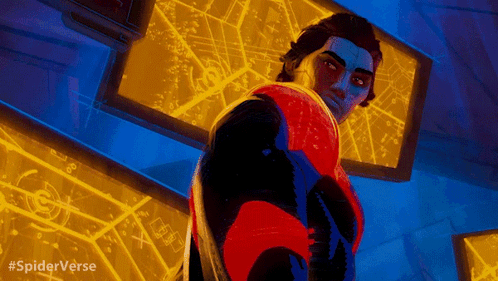
miguel o’hara x afab! reader
in which one of new york’s most famous models runs into an old acquaintance during a modeling gig.
had a lil drabble in mind so i wrote it!! thank you guys so so much for liking my last posts it means a lot!! tbh idk what this was but I was j writing. i’m open to write other characters but need ideas so pls drop some in my requests! formula 1 is also going to be continued v v soon!
thank you! 😪🙏🏼
>>>>>>>>>>>>>>>>>>>>>>>>>>>>>>>>>>>
You’ve always had aspirations of becoming a model, being on a billboard along with many celebrities you admired.
The posing, the glamour, the attention.
It was a dream you’ve always had, having an insatiable hunger for it.
You drank your chai in peace as you were just finished your Pilates class. You had a photoshoot later on to model some new brand that hit social media and exploded in popularity. It could help both your public images.
“Good morning, N/n!” Jess said, giving you a hug from behind.
Jess is your roommate and has been your best friend since your freshman year in high school. The both of you bonded over American pop culture, fashion, and the immense difficulty of your freshman physics class.
She had your back when you forgot the formula for net force and when you were having emotional turmoil over your crush on Miguel O’Hara.
Everyone knew about your crush on him because who would have a crush on the physics math geek?
You.
He was scrawny, quiet, a nerd, and no one knew who he was. Until people found out you liked him, which was obvious because you would get caught staring at him from across the lunchroom multiple times.
The two of you were polar opposites socially.
You weren’t popular, to say the least, but it’s not like people didn’t know who you are. There were a decent amount of people who liked you in high school, but you only had your eye on him.
Like Jess, he was also in your physics class freshman year and caught your eye.
He’s the reason why you wanted to do modeling.
>>>>>>>>>>>>>>>>>>>>>>>>>>>>>>>>>>>
It was junior year in your AP Lang class and you two were doing peer reviews for an essay.
You two were in a library near your high school. It was quiet until he just blurted out: “You should consider modeling, Y/n.”
Your eyes widened at his sudden compliment, “What?”
He just shrugged and pushed up his square glasses. “I’m just saying that you’d look nice on a cover of a magazine. You look the type.”
“O-Oh…Thanks?”
You mentally slapped yourself for sounding so awkward.
His face stayed as nonchalant as always, “Mhm.”
It was safe to say that there wasn’t a single word spoken after that.
>>>>>>>>>>>>>>>>>>>>>>>>>>>>>>>>>>>>>
Jess tied up her hair and stretched. “Do you need a ride? Isn’t the studio in Manhattan?”
You shook your head and sipped your chai, “Nope, it’s in Brooklyn. And it’s okay! I have some errands to run after the shoot if it won’t take long.”
“Alright, girl. What’s the guy’s name again? The guy that owns the brand.”
“I think his name's Gabriel?” You shrugged and took a bite out of your açaí bowl. Jess took a spoon and ate some too.
“Wow! You just take my breakfast huh?”
Jess giggled and ran back to her room, “Good luckkkk!”
You scoffed and smiled, “You bitch!”
>>>>>>>>>>>>>>>>>>>>>>>>>>>>>>>>>>>>
You took the train to get to the studio and walked there.
It was a little apartment building that had some graffiti on the side of the wall. You liked how nice the graffiti was.
You went inside and knocked on the door for apartment 206.
You heard some clutter and a voice all of a sudden, “-Coming!”
The door opened to a young man, maybe in his 20s? Early 30s?
“Hi, my name is Gabriel! You’re Y/n Y/l/n? I’ve heard so much about you! You’re an amazing model. Your magazine shoot with Vogue was so nice!” he gushed.
His voice sounded really familiar but wasn’t at the same time.
“Oh thank you so much! Your brand is actually really nice! Thank you for reaching out! Can I come in?”
He rushed in and stood to the side of the door, “Of course! Come right in!”
The apartment was really nice and was a decent size. Not too big and small.
Some assistants were running around getting some clothes ready and preparing the violet backdrop with a silver desk that looked like something out of Star Wars.
You got into many different outfits which were really modern and motorsport-ish.
It reminded you of that futuristic streetwear style that’s growing these days, which was really fresh to see.
Gabriel popped in from the lounge area where you were already dressed to go home, “You did really good! Again thank you so much for coming! It’s going to do the brand so so well!”
You smiled and nodded, “Of course! It was nice meeting-“
You heard the door open and was interrupted by another voice, “Hey Gabri, you left your electronic watch at my place.”
Gabriel smiled and went over to claim his watch, punching the man in the arm, “Thanks Miggy!”
Your face twisted from a smile to a shocked expression.
“Oh! Y/n, meet my older brother, Miguel!” Gabriel said, pointing at his brother.
“Miggy, meet Y/n Y/l/n! She’s an awesome model who’s helping me promote my brand!”
He looked over to you and stared, “I’ve heard of who she is.”
You couldn’t help but have your jaw drop. Your eyes couldn’t believe it.
That scrawny, shy kid from high school was no more. He got replaced by a man with a body identical to a greek god’s, beautiful, luscious locks of chestnut hair, and gorgeous arms.
He still had his old square glasses which added charm to the rest of his outfit; a black compression shirt and grey sweatpants.
He made you feel like you were back in high school, crushing on him while he explained formulas to you.
“I said ‘hi’, Ms. Y/l/n,” he smiled, looking you up and down. You didn’t know if he was being judgmental or just observing.
“O-Oh! Hi!” You held at your hand to Miguel, who looked a slight bit amused and shook it.
“My brother here is a chemical engineer at this place, Alche-what?”
Miguel rolled his eyes and laughed, “Alchemax. And it’s nice to meet you, miss.”
Gabriel smiled and checked his phone due to it ringing loudly, “Shoot! I have to pick up some fabric I ordered. It’s the last one they have! Migs, please lock up! Good bye, Ms. Y/l/n!”
Gabriel ran out the studio and threw the keys at Miguel, who caught them quickly.
Miguel looked back at you and smiled sarcastically, “Y’know, it would’ve been nice if you weren’t eye fucking me in front of my own brother, Ms. Y/l/n.”
You felt shivers down your spine.
The way your last name rolled off his tongue was so sexy, especially with that slight accent he’s always had.
You tried to say something so you wouldn’t look like a complete idiot in front of your high school crush, “E-Excuse me…?“
“You heard me, Y/n.”
Oh fuck.
“I b-believe you’re mistaken. I would never do that in a professional setting with someone I work with.”
You mentally cheered yourself on. You weren’t sounding like an idiot anymore.
You don’t think.
He hummed and shrugged, “I didn’t think I would see you working with my brother, yet here we are. How’s life been?”
What the fuck?
How could he be so calm and asking ‘how’s life?’ after accusing you for eyefucking him.
He wasn’t wrong but it’s embarrassing.
“It’s fine. So you work at Alchemax?”
“Yeah. We’re working on something right now, but I can’t tell you.” He started chuckling and folded his arms
God, how much you loved that in high school.
Even then, he would make every single little thing so sexy.
In high school, he looked like he had never experienced a touch of a woman.
But now…
“Why not?”
He leaned down and whispered in your ear, “It’s top secret, nena.”
You looked at him from the side of your eye and he locked eyes with you.
You couldn’t deny the rough tension in the room.
His eyes were a beautiful shade of ruby red, accentuated thanks to the blinding glare of the studio lights still being on.
Then you locked your eyes to his lips. They were so full and beautiful and you wanted to kiss them.
He smiled at you and was going to pull back from his leaning position before you wrapped your arms around his neck and connected your lips to his.
You’ve been waiting since freshman year to kiss him. Who could blame you?
What you didn’t expect is for him to kiss you back, more rough and passionate.
You felt him smile a bit, making you kiss him even more.
It didn’t take long for you and Miguel to walk towards the desk, where he broke from the kiss and pushed you against the desk, ass facing him.
You were still in disbelief that you were making out with your high school crush so suddenly, making your heart pound.
You were wearing one of your favorite outfits; a black corset top and a white lace skirt you stole from Jess.
You felt him rub your ass before he spanked it under your skirt, hearing him growl a bit. “Fuck…”
He leaned towards to kiss your cheek, feeling his hard bulge from his sweatpants. “Let me make you feel good, cariño.”
Did you mention you loved it when he spoke in Spanish? You loved it when he spoke in general.
You turned around and sat on the desk as you took off your top and slid down your skirt, leaving you in your panties.
He looked at you up and down again, now with underlying lust and darkness in his eyes, “I’ve been waiting to do this since high school.”
He roughly took his shirt off and also slid down his pants, leaving you to gawk at his stunningly toned body.
“Like what you see? Careful, mi bélla, you have something aquí,” he smirked as he caressed your face.
He placed his hand on your hip and played with the string of your underwear before ripping it apart with his (abnormally?) long nails.
“That’s better,” he said as he pulled the piece of clothing off of you. He took off his boxers and as soon as he did that, you kneeled down and started rubbing on his length.
“Let me make you feel good first.” You started grazing your lips on it and kissed his swollen tip, already oozing with precum.
You put him inside your mouth and he started to gently thrust as you started to suck.
“Yeah baby, you feel so fucking good-"
You felt like gagging, taking him all, thick, long, and veiny.
It didn’t take long for him to ejaculate in your mouth, having you swallow and some of his cum spilling on the sides of your mouth.
“God, you look so sexy like this,” he whispered, brushing some of your hair away from your face. You smiled up at him as he bit his lip.
He sat you on top of the desk, legs wide open.
He started to play with your clit and inserted two fingers almost immediatly to your already wet core.
"M-Miguel...fuck."
You whimpered quietly as he started to fingerfuck you fastly.
He chuckled darkly, "If you can't handle my fingers, then I'd like to see you handle my cock."
You laughed dryly and cried out as he went even faster.
Right as you were going to come, he stopped.
"Why did you do that," you slurred, feeling high on the sexual tension.
"Don't worry, just wait."
He whispered as he kept teasing your poor clit and started to pump his dick.
"Shhhhh" he muttered as he started to insert himself inch by inch, “Estas haciendo bien, mi linda. AY DIOS-"
Your eyes widened at how much he stretched you out, and it was barely the tip. "Oh fuck, Miguel-"
"D-Don't worry, baby. You're doing good..."
You scratched at his back as you bounced again and again. "O-Oh my fucking god..."
You felt like you were in a porn movie with how loud your moans and how bright the studio lights were, accentuating every crease and muscle on Miguel’s hot body.
You couldn’t help but stare as he mindlessly rearranges your organs fucking you.
You started to hold on to his arms as he went at a violent pace.
“A-Alchemax must stress the living shit out of you, h-huh? F-FUCK!”
He smiled a bit as he went a little faster, “You can’t...imagine. Estos pinche- PUTA MADRÉ-"
You felt him twitch inside of you and release, filling you up to the brim as you released your high as well.
"Oh s-shit..."
You mumbled before covering your face, turning over to hide your face and just bent over.
He kissed your exhausted body on the desk, all sweaty and hot from your tiring activities from earlier.
As he dressed up again, he couldn’t help but stare at his masterpiece; having Y/n Y/l/n, one of New York’s most respected models, in such a slutted out position.
Bent over and trembling, filled up to the rim with his cum.
Although he was a chemical engineer at such a highly respected place such as Alchemax, he couldn't help but feel proud that he had you like this.
Just for him.
#miguel o'hara#miguel o'hara x reader#miguel o'hara smut#spiderman 2099#spiderman 2099 smut#spiderman 2099 x reader#miguel o'hara oneshot#miguel o'hara fanfiction#miguel ohara#across the spiderverse#spiderman across the spiderverse#spiderman astv#astv hobie#marvel#marvel smut#fanfiction#miguel o'hara fanfic#x reader#miguel ohara x reader#miguel ohara smut
396 notes
·
View notes
Text
Spoiler-Free Advance Review:
Exordia by Seth Dickinson
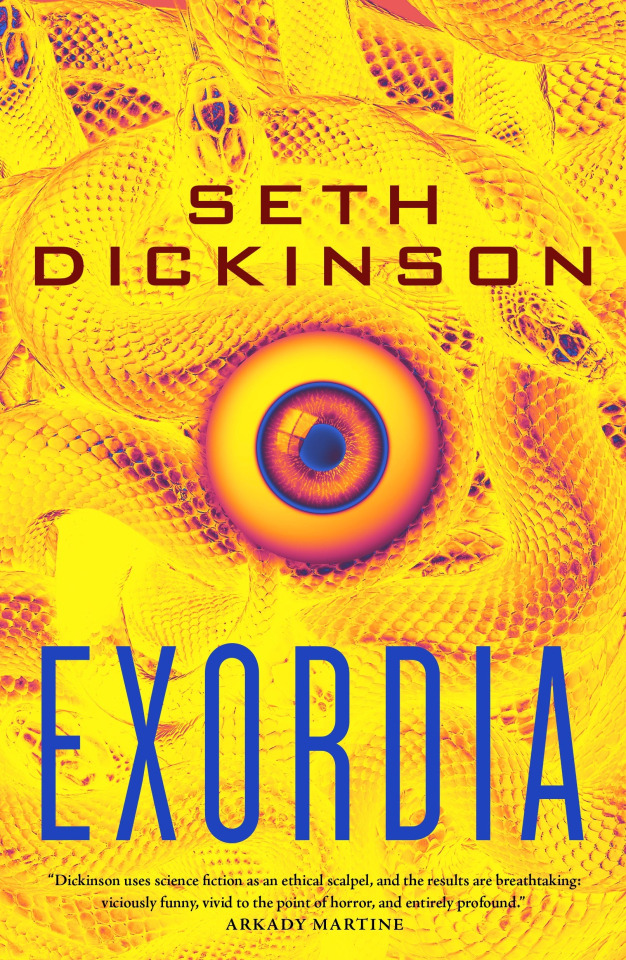
I could not put this book down, my god. Staying up super late multiple nights because I couldn’t stop reading is such a great problem to have, and Exordia gave me that problem more than any book I’ve read in a few years.
This is a very different book than Baru, but Seth’s evocative prose and dark humor is familiar from page one, and the laser focus on defamiliarizing real world injustices is again the core of the work. Despite being far more immediate (Exordia is set during the Obama administration in our world, with an alternate history beginning from the moment the book starts), the heaviness of the topics never gets overwhelming. There’s some incredible (and extremely fitting) tonal dissonance here, with every perspective character having their own sense of disaffected humor about the apocalyptic situation they’ve been thrown into.
I described this to my friend after just starting as “if the Books of Sorrow were written with Gideon the Ninth’s tone and just straight up in our world,” and I think that remains true throughout. There’s a huge amount of references peppered in, and it helps maintain that lighter tone to balance the despair of what is essentially a doomsday clock ticking down throughout the book - and it helps keep things grounded, honestly. I never felt it took away from the gravity of things, or was unnatural - after all, if I, an early 21st century sci fi nerd, was thrown into some fucked up alien bioweapon mystery, it’s hard to say my first thought wouldn’t be “oh shit, this is just like the Andromeda Strain!”
Having seven (eight?) different protagonist (or deuteragonist, I don’t know which they qualify as) PoVs is pretty wild but works perfectly here. Every character has such a unique outlook that you can instantly figure out whose head you’ve popped into even before any identifying names or things are mentioned - Seth’s mastery of the tonally cohesive PoV shifts was something I had loved in Tyrant, especially, and they’re equally impressive here. The characters are lovable, hatable, and everything in between - and each as mentioned is so distinct and compelling that I can’t say there was a single character who I was unhappy to get into their head. And that’s saying something, given who some of these characters are, but I’ll leave the specifics a surprise. Predictably, my favorites were the dysfunctional autistic butch-femme lesbians, but I really loved all of them in the end.
The base premise is almost comical in how small it starts to how much it escalates - a cynical, disillusioned Kurdish genocide survivor, Anna Sinjari, meets a terrifying (and yes…very hot. I’m a simple woman) alien in Central Park, and this seemingly chance encounter sees her roped into a small group of scientists, soldiers, and her own mother in a desperate countdown to solve an otherworldly mystery and save their world. The twists and turns of the plot are intense, so engaging that I was bouncing up and down at times (there’s plenty of sci-fi insanity that I absolutely eat up), and tightly paced.
Seth seems to really enjoy writing ethical dilemmas to great effect, and Exordia is ruthless in that area, taking the base concept of the trolley problem and the moral justification for what someone would sacrifice for the greater good and carving it apart for narrative weight. What greater good does the sacrifice serve? Is it actually good? Who gets to make the choice, and do they have a choice but to make it? There’s a lot to dig into here, and Exordia is a four course meal.
One aspect of this simply taking place in our world, rather than being an alternate universe like Baru, is that the defamiliarized commentary is even more on the nose. Whereas Baru is a commentary on empire and homophobia as a whole, transparently pulling from primarily American history of genocide and imperialism to shape a culture unlike our own in many ways to defamiliarize this moral exploration, Exordia is just literally about real world American imperialism and enabling of genocide in the MENA region, primarily the ramifications of the military industrial complex’s usage of drone warfare and the extremist regimes armed and encouraged by “counterterrorism.”
All this sets the stage for the question of what happens when a bigger fish arrives, one just as hell bent on empire building and justifying its own atrocities. The sci-fi intervention into this banal evil is at the same time a reflection of that evil, and asking if the world has the capacity for resistance to both. Exordia’s answer is profound, and far from easy, but entirely fitting for the ethical dilemma that runs throughout the book, creeping up on you slowly as you start to recognize what shape it takes in this story.
The central material conflict of the book, a locked box mystery of sorts that you piece together with the characters, is fucked up and fun and scary, a reality shifting threat that treads the line between body horror, meta-narrative, and lovecraftian math. It’s extremely cool, and I think it’ll be right up the alley of fans of The Andromeda Strain, The Locked Tomb, The Books of Sorrow and other parts of Destiny lore, and a lot of other SFF stories where ethics, horror, and mystery mix together.
I don’t want to say too much about the climax and the ending - going into this book without knowing too much was an incredible experience that had me on the edge of my proverbial seat - but the ending left me asking myself some very similar questions as I had at the end of Traitor, and I cannot wait for a reread when the physical book is in my hands to see what little foreshadowed things I can pick up on.
I don’t think people are going to be quite as completely emotionally Destroyed at the ending of this one as Traitor, but…it is very much a Seth Dickinson book, and they have quite the talent for making every thread tie together at the end to make the reader feel every emotion at once and realize that this could never have gone any other way. I cried, I laughed, sometimes simultaneously, and a book that can do that to me is entirely worth the experience - and what an experience this was.
Absolutely fucking incredible, I want more of these characters and everything they’re wrapped up in, 10/10.
I received an ARC of this novel from NetGalley in exchange for an honest review.
80 notes
·
View notes
Note
i saw ur post on how there isnt rlly a big arab figure, and wow like. i think that if i had been younger and saw just one or two arab people on tv in a positive way, it would have helped me a LOT. like yeah. There ISNT a big singer or character or actor or model that’s arab. And now im sitting here wondering how many kids are going to be sitting and watching tv and just blocking out their arab heritage and culture because then they wouldnt be like their favorite singer or wtver.
Exactly. Exactly exactly exactly. I’ve full chest said this before, but I wasn’t always as attached to my Arab heritage as I am now. I actually grew up pretty distant from it all around, and it’s only in recent years that I started making a concerted effort to delve into it. And I can’t even blame it on my mom tbh, like I grew up in a lax household that allowed for ample self-expression. It was always the outside world that would make a little Arab girl like me question the worth of her ethnic roots—especially when Arabs are painted as terrorists at worst and as monocultural heathens at best where I’m from (hint: the USA). There is so much to unpack w being raised American but being ethnically Iraqi!! Because that means I literally hail from two countries!! A country that’s thirsty and a country that’s on fire!! But that’s a whole other loaded topic I could write a separate dissertation on.
I’d always have toxic thought loops like “I don’t look Arab enough” “I’m not religious but all the Arab girls I know are Muslim” on and on and on. And like I said in that ask, there was never an Arab American A lister for me to kind of have a frame of reference w. This is specifically an Arab issue too I feel like, bc a lot of brown people do have that star-studded figure to look up to growing up. We do not.
It’s kind of why I decided to be that for myself. I don’t need a cool Arab girl celebrity who’s into fashion or music. I’ll be that. I don’t need an Arab academia girl character. I’ll be that too. There’s no such thing as not looking Arab enough bc Arabs are so diverse. It’s okay that I’m not religious bc Arab culture is not solely defined by religion, and even if it were Arabs are not a hive mind and everyone engages w their culture in vastly different ways (which is okay!! It doesn’t make me any less Arab). I’ll literally just discard other people’s preconceived notions and trailblaze my own path!! I’ll be my own Arab girl representation. I refuse to fit myself into any preexisting mold. I like what I like and the rest just falls into place.
I think that’s why I’ve been so vocal about my Iraqi heritage lately… I’m literally healing my relationship w my roots in real time. Even advocating for Palestine is feeding into that in major ways. It’s legit all coming together for the first time in my life. Now I’m so proud to be Arab—to be Iraqi—that the idea that anyone could shame me for it is as incredulous as it is hilarious. Iraq is literally called the Cradle of Civilization & you want to make me feel BAD for being Arab… for being Iraqi… it’s just impossible bc I can’t imagine myself being anything else. I’m so content to have my multicultural background and to be who I am. I wouldn’t trade it for the world.
It’s also cool that I have people following me, that they could also be exposed to diverse facets of Arab culture bc of that, but tbh a lot of this is also purely for me. I want the Iraq tag to be flooded w beautiful Iraqi poetry and beautiful Iraqi art and beautiful Iraqi cinema as I familiarize myself w Iraqi culture more and more, bc there’s so much more to it than the Iraqi War stats that pop up when you look it up on here.
I’m a 21 year old girl AND I’m Arab. That’s literally double the self-discovery to work through. Fortunately I think I’m finally cultivating a strong sense of self, so I really don’t think anything anyone has to say could deter me from my path (whether it be in terms of reconnecting w the beauty of my Arab heritage or legit just growing into my own). It’s not always perfect by any means, but I’ve made so much headway. And absolutely nothing could take away from that.
#I had a LOT of thoughts on this but thank u for giving me the opportunity to rly unravel this anon <3 <3 <3#I still have a lot of things to go to therapy for lmao but suppressing my Arab roots is absolutely one thing I’ll never have to talk about#the confused Arab girl who was disconnected from her heritage is DEAD give me all the Iraqi history books I want to devour them all#ask#arab tag
30 notes
·
View notes
Text
TUA Fic: Witchy Prompts 01
It's day 2 and I'm already behind, but I love these prompts, @myloveforhergoeson!
01. Cackle
Klaus is sitting cross-legged on the sofa, hunched over the phone in his hands. It’s a familiar sight lately; Klaus has been working his way through the American Film Institute’s “100 Greatest Movies of All Time” in an effort to catch up on all the pop culture touchstones they missed out on in their childhood.
“NOOO! You can’t kill her off!” he suddenly exclaims, leaping to his feet.
“The hero dies in this one?” Ben asks
“Ugh, I wish! Podunk little brat just straight up melted my main bitch”
“Ah, Wizard of Oz?”
“You’ve seen this??”
“Read the book. Loved it as a kid”
“Well I’m done with it forever. She dared to serve cunt beyond these people’s comprehension and they killed her for it”
“I don’t really remember much about the witch to be honest”
“Are you kidding me?” Klaus gapes at his brother “The bone structure? The drama? The all-black ensemble? The nails???”
“Oh that's why you love her, sounds like she’s basically you”
Klaus lets out a peal of laughter that he transitions into a cackle as he hooks his fingers into claws and stalks toward Ben.
“I’ll get you my pretty! And your little Horror too!”
#I'll catch up#or fall further behind#the umbrella academy#klaus hargreeves#ben hargreeves#ben x klaus#horrance#drabble#fanfiction#witchy prompts#promptober
9 notes
·
View notes
Note
Hi! I'm here to answer your question with my semi-obscure nerd knowledge fghgfhjfgjhfgjh The reason a lot of zombie media seems to refuse using the word "zombie" is because The Walking Dead did it first. A key part of the general worldbuilding for The Walking Dead is that in their universe, the pop culture idea of a "zombie" never existed. This is the in universe explanation for why none of the characters at the beginning go "Just shoot it in the head like in the movies!" and instead have to learn through trial and error. Therefore, as a consequence of that decision, they don't have the term "zombie" to use in the first place. Walking Dead clones basically saw this consequence of a worldbuilding choice, went "oh use cool words! got it!" and went from there lol
aw booo. It makes sense though, if I remember correctly the concept of a zombie the way most media does it has its origins in african american religions, so if it never got popular in universe you’d have less of a reference frame.
not every thing doing that is a walking dead clone though. The only one I’m really familiar with is the Last of Us, and there they use “infected” as a catch all which does make sense since it’s all very medicalised and focused on “doctors can find a cure, it is possible to be immune to turning into That and still be infected”. And it’s fungal infections. They never bring up the concept of zombie media predating their own world state either
10 notes
·
View notes
Text
Deuce Info Compilation part 5: Epel
Like most students Deuce judges Epel by appearances and assumed he was a girl the first time he saw Epel, back in Book 1. He also makes assumptions about Epel coming from “a real rich family” (untrue).
In a PE vignette he assumes that Epel would like flowers embroidered on his clothes (Epel: “I actually don’t like floral patterns.”)
When they discuss customizing their PE uniforms with dragons and tigers Deuce is surprised, saying, “I had no idea our tastes were so similar. I’m glad we got to talking today” and “I never imagined you had a hot-blooded streak too!”
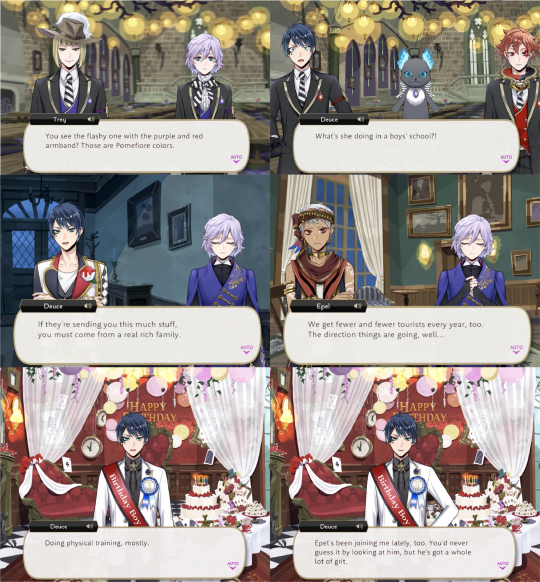
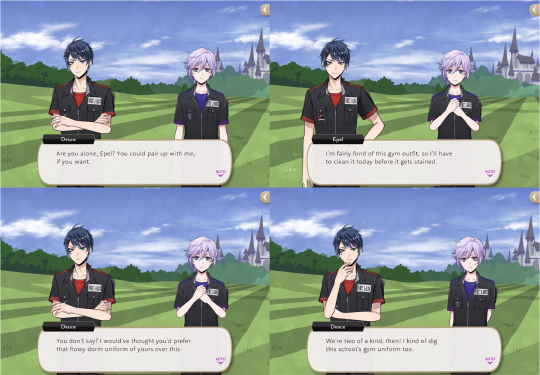
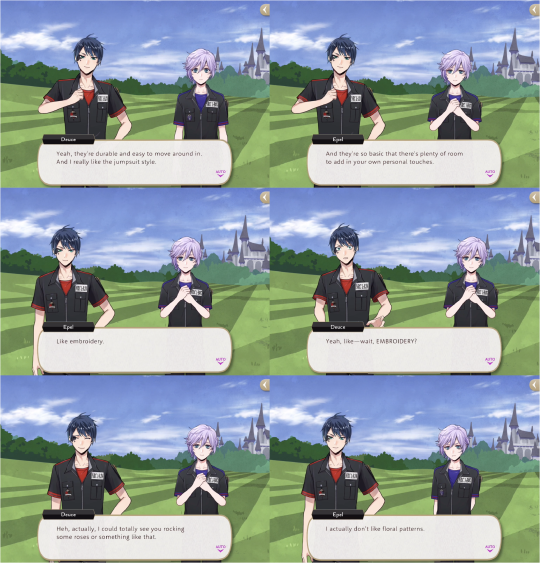
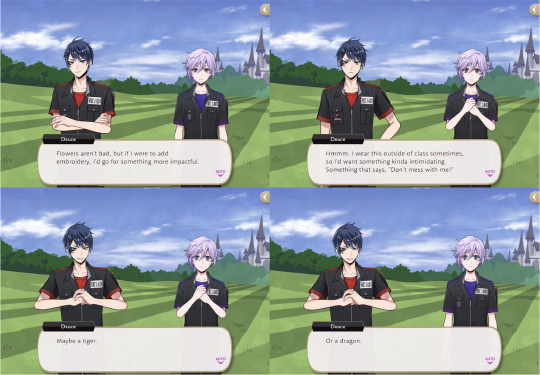
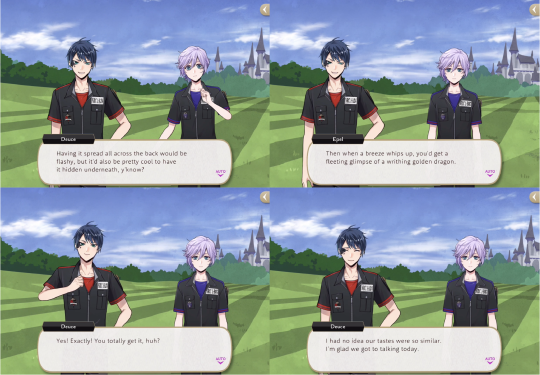
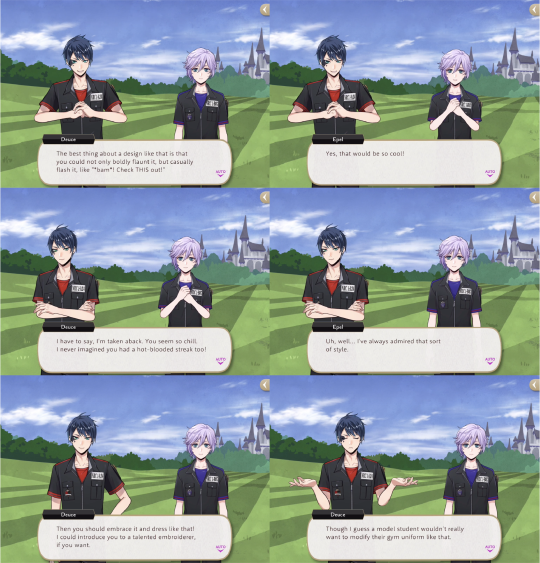
(The embroidered dragons and tigers might be a reference to vintage yankee fashion. In the guide book Yana says that Deuce will sometimes make “expressions where you can see the yankee influence”, so this was definitely intentional. For the curious: Yana is not saying that Deuce appears “American”.

The Japanese-language-term “yankee” is for a kind of subculture, the word adopted by kids/adults who want to look intimidating, prioritize having a good time over what other people think and rebel against the system in general. The term is probably from the American word “yankee” originally, possibly imported with post-war G.I. culture, but by now it is very much it’s own, independent thing (a great example of wasei-eigo (和製英語,) adopted English words that get assigned new meanings in Japanese.)
Yankee aesthetics have evolved over the years, with the clothes described by Deuce and Epel being kind of old fashioned by now. Yankees are also big on motorcycles, possibly tying in to Deuce and Epel’s love of blastcycles.
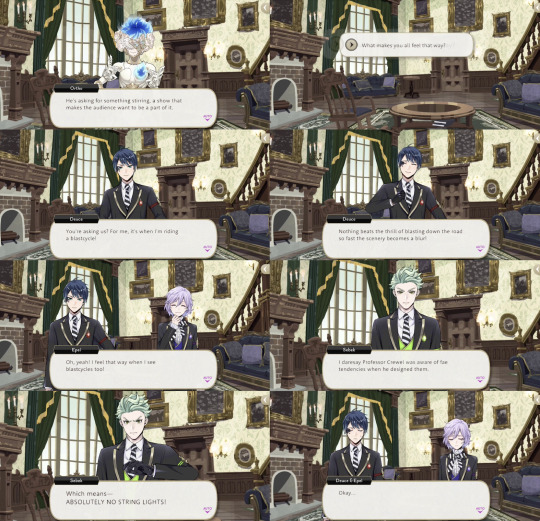
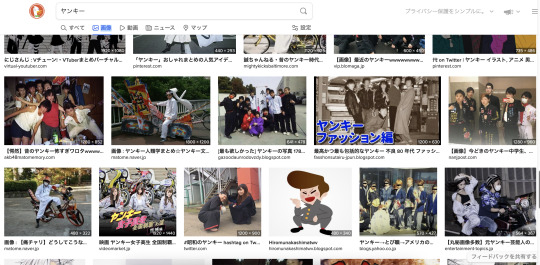
Yankees turn up a lot in pop culture as a phenomenon with which everyone is familiar, with ‘Tokyo Revengers’ possibly being the most obvious example at the moment. With that comment from Yana in the guide book and Deuce’s reference to how he used to bleach his hair (natural hair colors are often required by Japanese companies, so if you are a Yankee with naturally black hair rebelling against society , you go in the opposite direction by bleaching it blonde), it is very likely that Deuce was a Twst-equivalent of a yankee before being accepted to NRC and deciding to rebrand himself.)
We learn that Deuce also owns a hot pink leopard print clothing item of some kind, so that seems to be his preferred aesthetic.
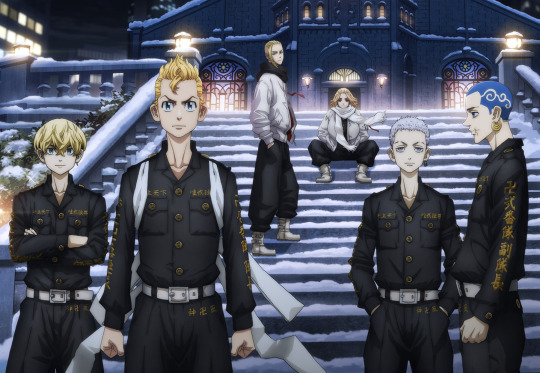

Deuce and Epel technically meet for the first time at the end of Book 4 when they physically run into each other, but don’t introduce themselves to one another until Book 5.
In Book 5 Grim asks why Deuce keeps getting involved in arguments between Vil and Epel and Deuce explains, “I’ve seen something in Epel ever since we ran into him by the courtyard well. I think…he and I are a lot alike…It’s about wanting to change, but not being able to…”
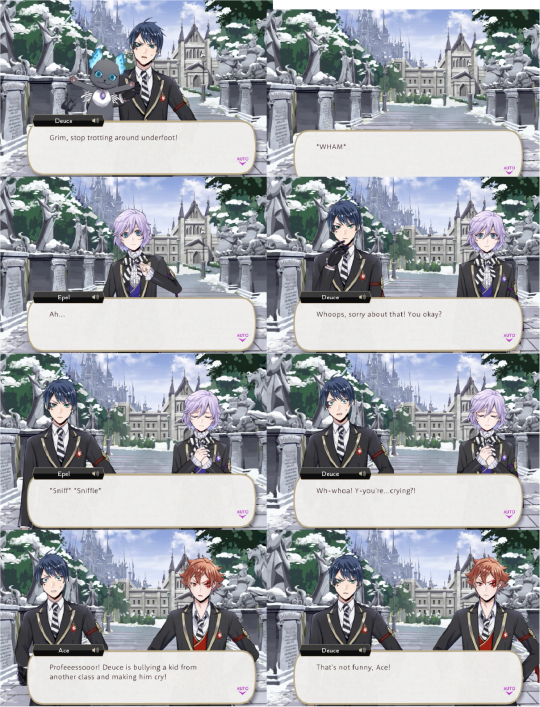
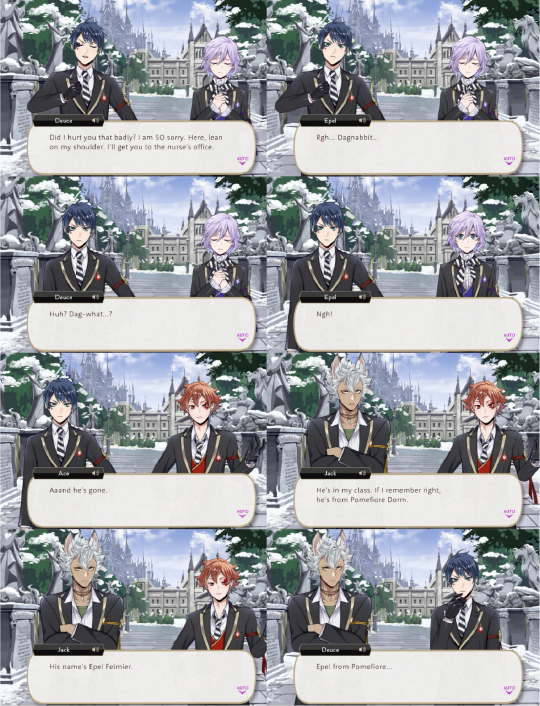
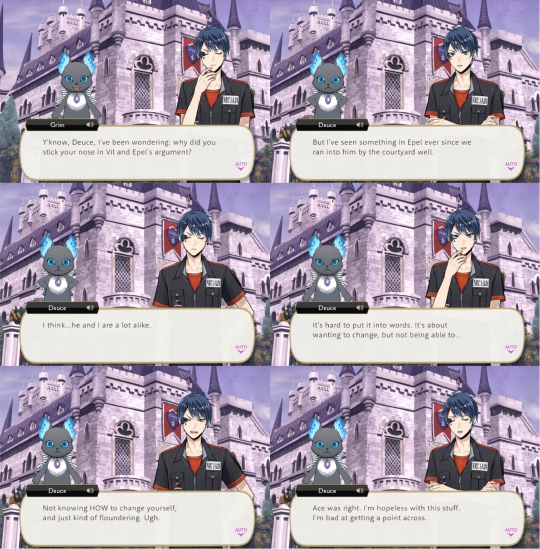
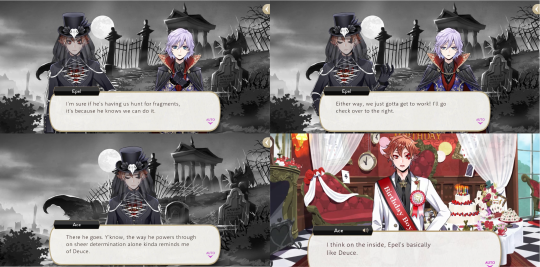
Ace also comments that the two are similar (“I think on the inside, Epel’s basically like Deuce”).
Rook gives him a pep talk about having a power that only he possesses, and Deuce borrows a blastcycle to take Epel to a beach for a cathartic scream. This is the point where Deuce finally realizes that, while he’d had Epel “pegged as a quiet, timid guy”, he was very wrong.
He follows up with “I bet nobody in this school has you beat in the cuteness department!”, however, still not fully understanding Epel’s position.
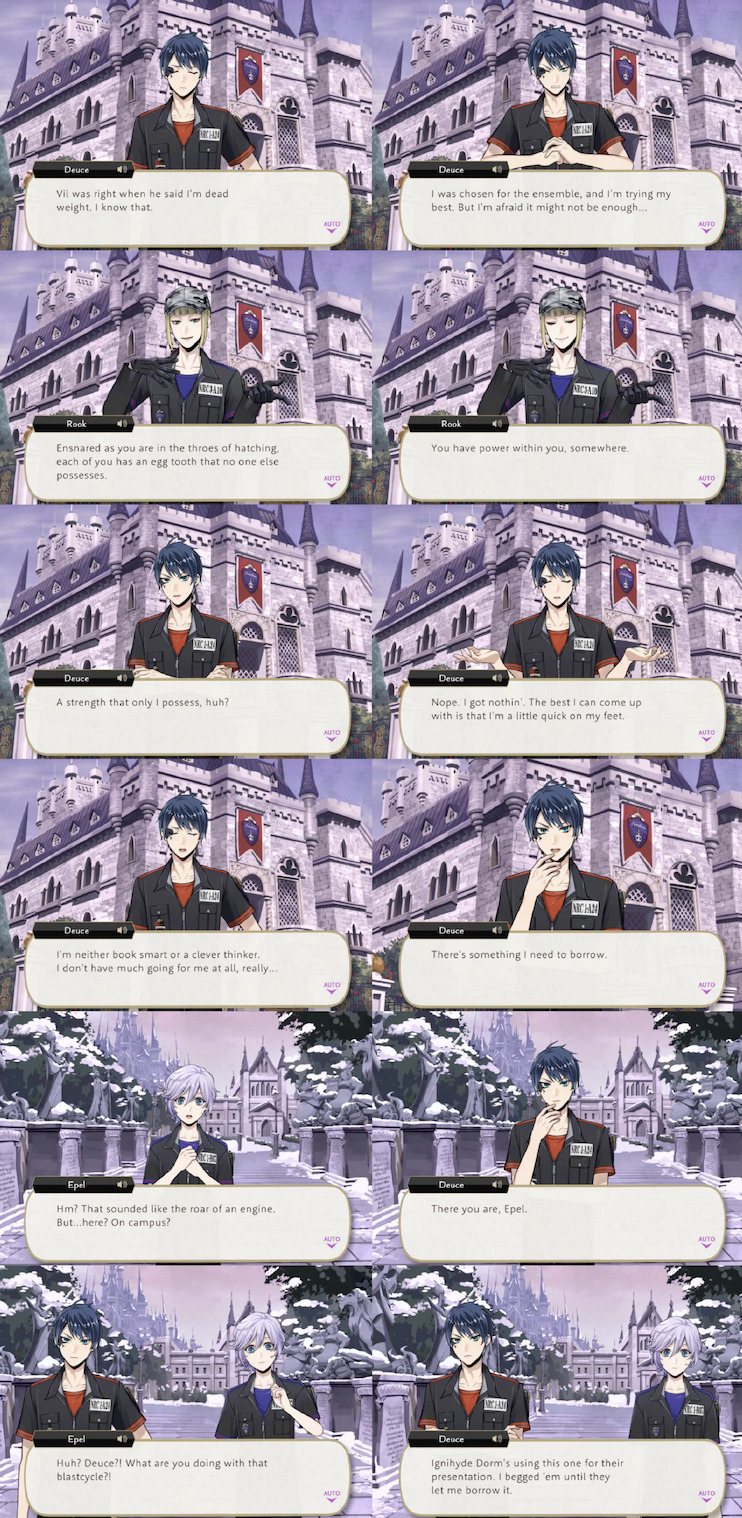
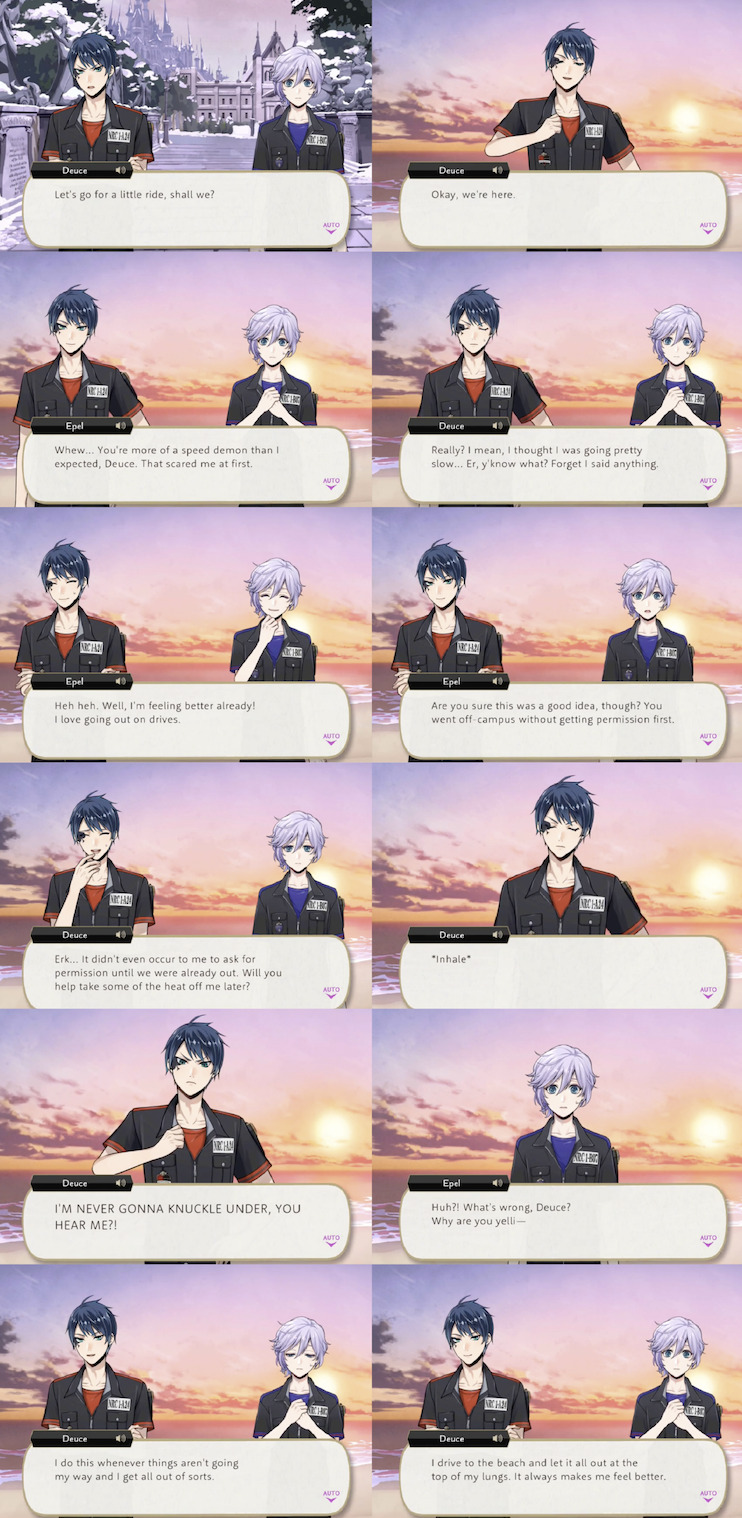
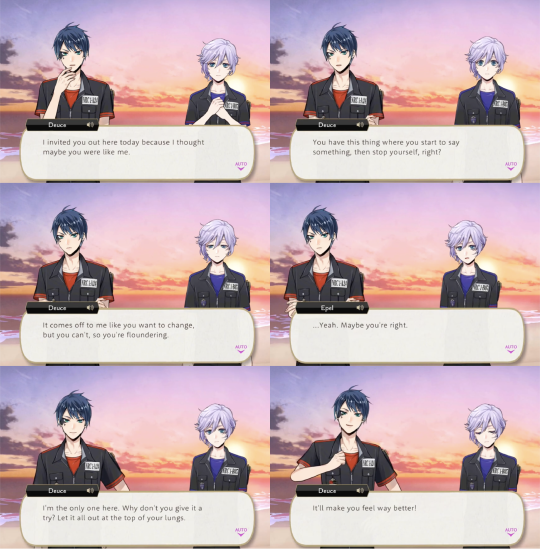
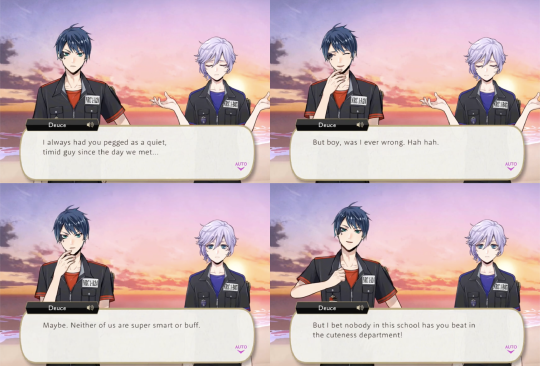
It is common for Deuce to defend his friends at a moment’s notice, and this applies to Epel as well: a group of unnamed and unseen strangers grab at Epel on the beach, mistaking him for a girl, and Deuce insists on taking responsibility for removing Epel from the safety of the school by handling the situation on his own.
We also see Deuce protecting Epel during the New Year’s event and Phantom Bride.
The two also have a great interaction during New Year's where Deuce teaches Epel how to take the best advantage of Sam's sale and Epel invites Deuce to visit his hometown of Harveston to help the village with its apple sales.
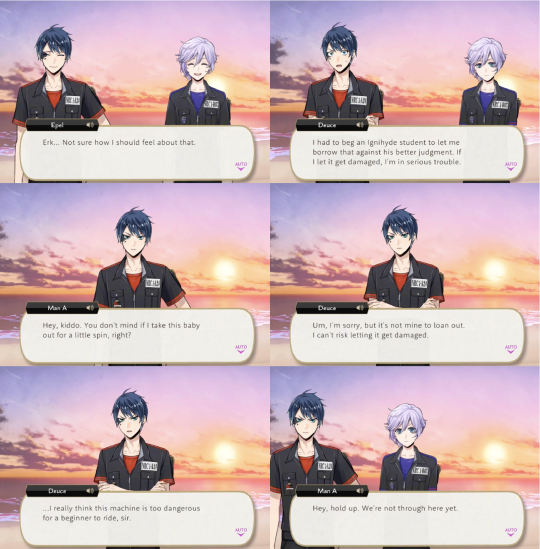
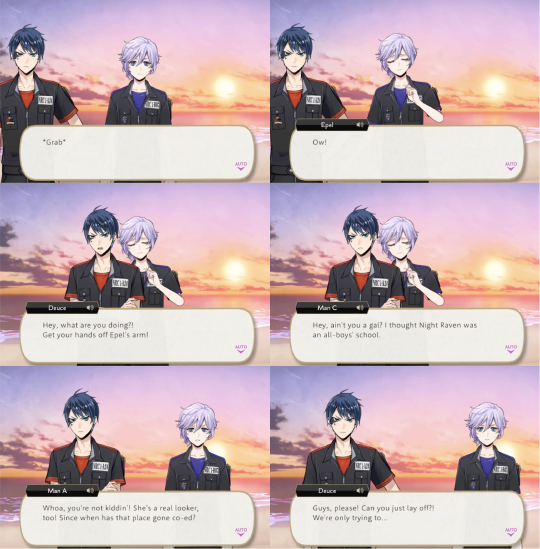
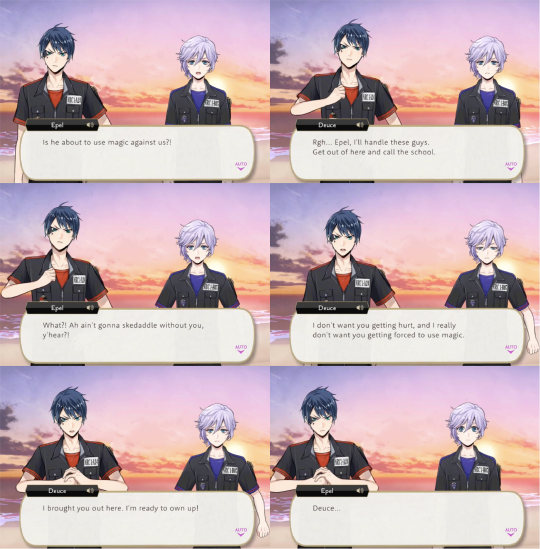
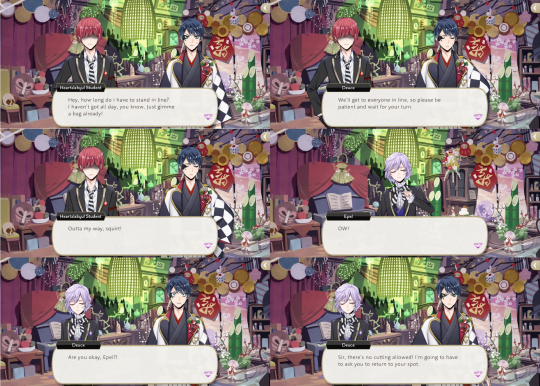
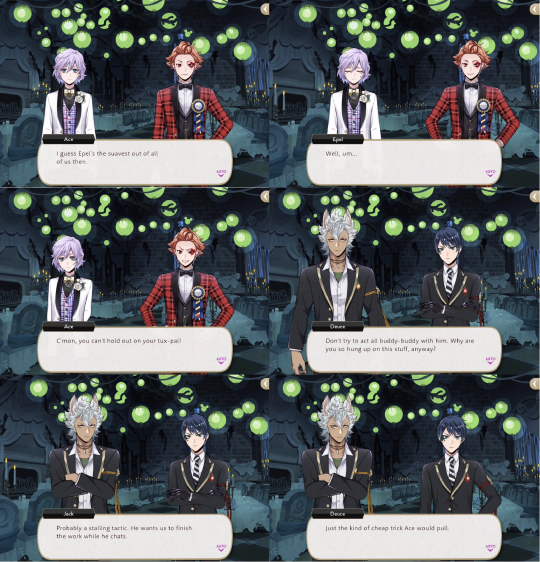
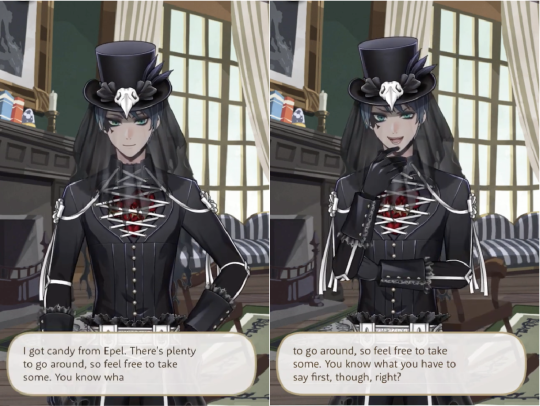
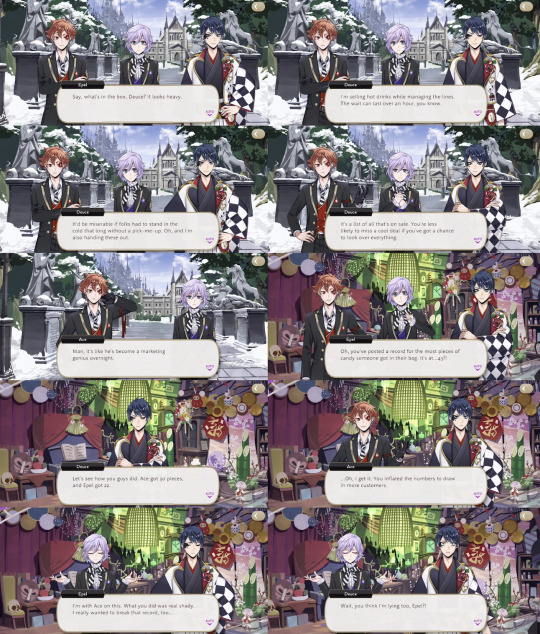
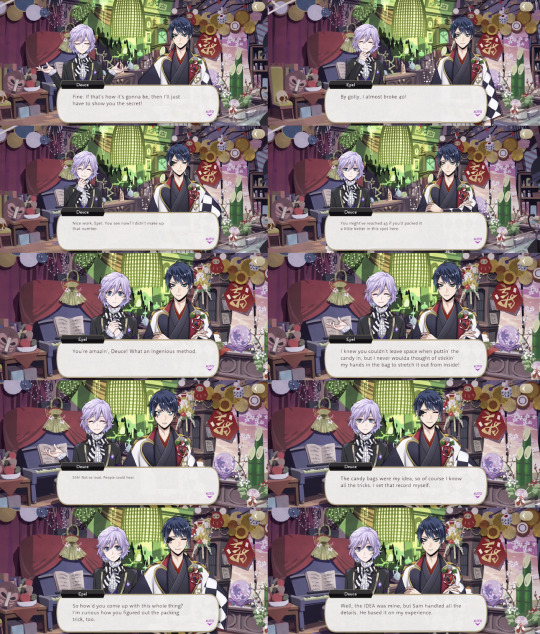
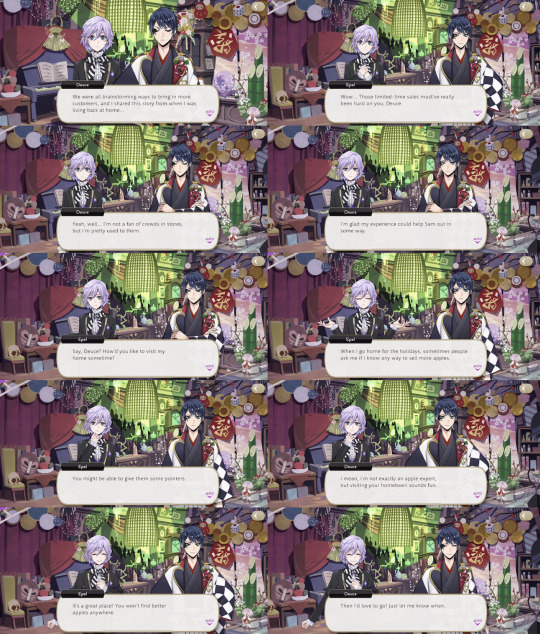
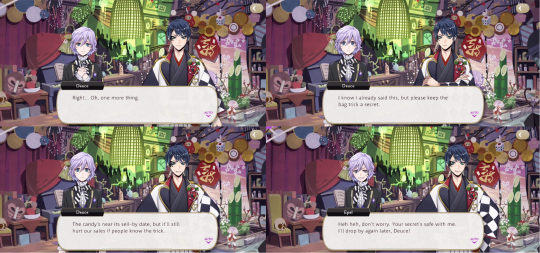
66 notes
·
View notes
Text
Obscure Animation Subject #160: Glitter Force
Remember Pretty Cure? It’s an awesome anime franchise with a bunch of action, memorable characters and beautiful animation. Now, the series had different incarnations per year but the core heart is still the same. Now, what if I told you the series was dubbed before? The first season of the first incarnation did get its own English dub simply named Pretty Cure, season 2 wasn’t dubbed unfortunately. However, that was only in Canada. It wasn’t introduced in the States until 2015, when Saban and Netflix created an English dub based on Smile Pretty Cure!, under the title Glitter Force.
This title change was actually met with backlash among Pretty Cure fans, as the first season of the original was dubbed with the Pretty Cure name attached. However, this could be understandable in my perspective as different incarnations of Pretty Cure usually have different protagonists. While the original series had 48 episodes lasting from February 5, 2012 to January 27, 2013, this dub had 8 episodes cut and was split into two seasons, lasting from December 18, 2015 to August 26, 2016. Although 8 episodes isn’t the majority of the series, it resulted in plot holes with character development lost. You wanna know why 8 episodes have been cut? It’s because Saban want this dub to look AMERICANIZED, REMOVING JAPANESE REFERENCES, AND EDITING OR REMOVING EMOTIONAL SCENES JUST TO MAKE IT APPEAL TO LITTLE KIDS! Does that sound familiar to what 4Kids did to One Piece? I mean sure, the series is targeted at kids, and its original Japanese version did originally air on TV Asahi on Sunday mornings where children would be watching, but that’s because what Japan views kid shows is actually different when compared to the US. I’m actually okay if the names were changed as long as the content isn’t altered much, and yet there's a lot of alterations resulting in a lot of plot holes and character development being lost.
Really aside from the terrible Americanizing and cuts, the voice-acting is god-awfully annoying and don’t fit the characters at all. There are also very unnecessary pop culture references like a reference to The Wizard of Oz in one episode. It also tries to hard to be cool and hip with kids with slang such as "besties", "epic win", and "selfies". There’s also some unnecessary screen dimming as a way to reduce seizures but it ends up being a distraction, and besides, the original Japanese version wasn’t flashy due to the Dennō Senshi Porygon incident. So yeah, pretty bad. There are some good things it did like introduce Pretty Cure to a Western audience, and some of changes actually making sense such as in episode 9 were in the farewell note the class gives to Lily, Cornelius (the artist who bullied Lily in episode 3) apologizes for making her cry, something that was never done in the original, but it’s not saying much. Although it was panned by critics, the series did successful enough to the point where Saban decided to dub the next Pretty Cure series under the name Glitter Force Doki Doki.
The original version was titled as Doki Doki! Pretty Cure, which lasted for 49 episodes airing on TV Asahi from February 3, 2013 to January 26, 2014, in the same timeslot as its predecessor. Saban produced the English dub under the Glitter Force Doki Doki name, lasting from August 18 to November 10, 2017. It carries many of the same issues its predecessor had, awful Americanization, bad voice-acting, dimming in some scenes amongst other reasons. However, it’s actually a lot worse when compared to its predecessor, as it actually has little to no connection to it, I mean the shows are mainly standalone aside from the Pretty Cure branding, none of the events in the previous series get mentioned, at all. And just when you thought that 8 episodes getting cut off from its predecessor is bad enough, well, this dub cuts a stunning 19 EPISODES FROM THE ORIGINAL VERSION, NOW BRINGING IN JUST 30 EPISODES! Some were even cut because they had too many references to Japanese culture. This caused even more continuity errors and missing character development. In response to the failure of the series, Saban filed for bankruptcy, selling most of its assets to Hasbro, and shuttered operations on July 2, 2018. Hasbro still owned the English rights until licensing for both series expired by 2024, resulting in Netflix removing them from the service. Toei now owns the full rights to both series, indicating that both series will be streaming on Crunchyroll English subbed in the future.
It’s no wonder that Saban had to be killed off really, and it’s a shame because they gave us classics like Digimon and Power Rangers. Too bad its founder, Haim Saban, is a complete homophobe and is also pro-Israel. Remember, SAVE PALESTINE FOLKS!


#anime#pretty cure#glitter force#english dub#obscure animation#censorship#toei animation#saban entertainment#netflix#tv asahi#save palestine#americanization#plot holes#infamous
2 notes
·
View notes
Text
Mischa Sunday Telegraph Interview

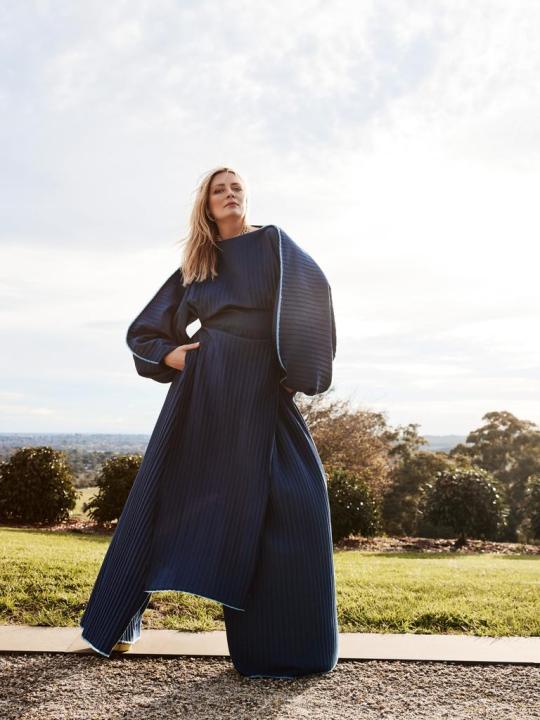

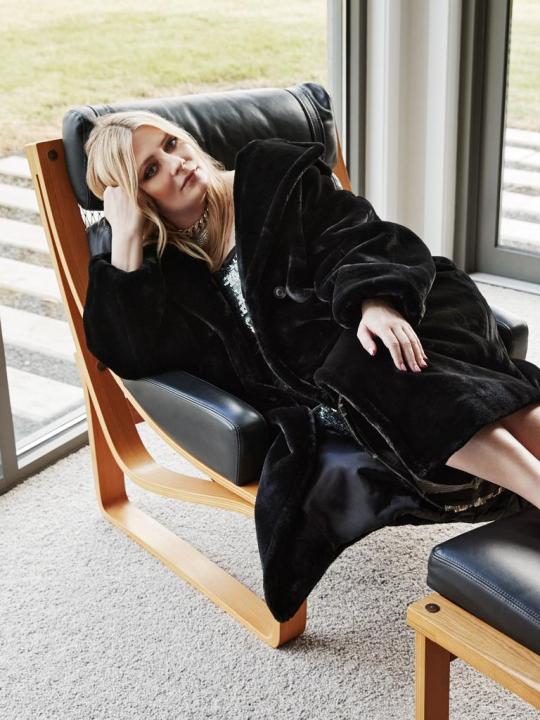
Why Mischa Barton said yes to surprise role on Neighbours
She was the star of the hottest teen drama of the noughties, but The O.C’s Mischa Barton shocked everyone when she signed on to the revival of Aussie soap Neighbours. Now she exclusively reveals to Stellar why she gave up work in the US for a show she’d never seen in suburban Melbourne.
After starring in the hottest teen drama of the noughties and being idolised for her every fashionable move, Mischa Barton surprised everyone when she signed up for some suburban drama on Australia’s most famous cul-de-sac in a revival of Neighbours. But then the British-born, US-based actor – who started her career on the stage and in soap operas – has never relished the role Hollywood chose for her. In an exclusive interview with Stellar, the 37-year-old recalls being cast in The O.C. because she “wasn’t anything like the other young blonde girls going in and trying out” and reveals how she’s taken charge of her own narrative.
Craning her neck forward, Mischa Barton lets out a squeal of excitement as she hears the first bars of Neighbours actor Stefan Dennis’ 1989 single ‘Don’t It Make You Feel Good’ emanate from a mobile phone. “I’m adding that to my playlist!” she exclaims with a throaty laugh, before plotting how she will tease Dennis on the Neighbours set the next day, her first suggestion being that she might just broadcast the tune loudly in her dressing room.
While Barton was a fan of Kylie Minogue before joining the Neighbours cast, she was far less familiar with the era-typifying swerve into pop music made by Dennis (who has been playing the show’s “villain” Paul Robinson since 1985), let alone its reputation for turning out future Australian music superstars. As such, she can confidently say it’s “very, very unlikely” that her 10-week stint on Ramsay Street was motivated by a secret desire to follow in the footsteps of Minogue, Natalie Imbruglia, Delta Goodrem or even Dennis.
So if not music, then what did prompt the former star of the early 2000s teen drama The O.C. to say yes to a stint in suburban Melbourne working on a show that she has never seen, and that has no cultural footprint in the US, where she lives?
Certainly for Network 10, adding Barton to the cast was a shrewd move to create buzz when the series returns later this month, resurrected just over a year after its 37-year run came to an end and also airing for the first time in the US and Canada via Amazon’s streaming service Freevee (as well as streaming in Australia and New Zealand on Amazon Prime). For Barton, who wasn’t yet born when Neighbours debuted in 1985, it was a serendipitous chance to try something new, as well as reconnect with some old friends in Australia.
When Stellar spoke to Barton in June, a week before she returned to the US, she explained the role had “come at a really good time, because while I was loving living in New York, there’s a writers’ strike on. And it’s [Northern Hemisphere] summertime. So there’s really not that much work going around for a lot of my actor friends.”
Of course, the Hollywood actors’ strike – which was called in mid-July – has also compounded the issue for Barton’s fellow actors. However, practicality and picket lines aside, the real lure for Barton was the role of Reece Sinclair, a wealthy American who arrives in Erinsborough under the guise of doing business – but in reality, has a much more personal agenda to fulfil. “And then she falls for a guy,” Barton says with a smile. “It actually just felt like a very good fit for me in terms of a role I could really play. And I don’t always feel that way with television.”
Her sentiment is understandable given the 37-year-old’s most high-profile project since leaving The O.C. in 2006 was her surprising gear-shift into reality TV on The Hills: New Beginnings. A sequel to the popular MTV series that followed the daily lives of TV personalities Brody Jenner, Audrina Patridge, Heidi Montag and Spencer Pratt, it was sold to her as an opportunity to let people see “the real Mischa Barton”. Ultimately, she felt let down by the process.
“Would I do it again? Probably not something like The Hills,” Barton tells Stellar. “I think they’re even continuing to try to do it, but it just wasn’t really all the things that were promised around it, like clearing up any misconceptions or getting people to know you. There are just people putting
on too many fronts and they’re not being themselves. So if people aren’t being themselves, it’s impossible because I’m used to having a script. That middle ground is just too trying for me. It’s partially scripted but it’s not, but they can’t really say that. So it wasn’t my favourite experience.
“But I’ve never been attracted to that kind of fame, either,” she adds. “It’s not something that I chase. I actually veer away from it.”
Fame has long been an uncomfortable by-product of Barton’s chosen career. Asked whether she’s grateful to have become a celebrity in an era when smartphones couldn’t capture her every move, Barton sighs wearily. “You can always play the grass is greener thing, and I just don’t feel that way,” she says. “I mean, in a sense, it would have been much easier for me if there had been social media to combat all the ludicrous stories in the press. Now, kids can really show their own narrative. You can use your own social media to be whoever you want to be.”
She qualifies her reply after a brief pause: “At the same time, I don’t really love social media. So I’m fine with having come up in a time when it wasn’t around and things were, in one sense, a lot simpler.”
That’s why, rather than opting for a luxury hotel suite, Barton relished staying in a relatively humble cottage nestled behind Melbourne’s bustling Chapel Street for the duration of her time filming Neighbours. There, she could cook meals for friends, do her own laundry and, when her schedule allowed, walk to the Prahran Market to pick up fresh fruit and veg. She also found time to indulge in a bit of shopping, and admits that she would be going home with far heavier suitcases than when she arrived. “I really liked a vintage store I found there,” she says of Chapel Street, which is known for its eclectic mix of high-end boutiques and second-hand clothing markets. “I did a lot of damage in there.”
Filming in Australia meant such excursions could be enjoyed without being recognised or photographed, and added a layer of protection for Barton, who has learnt the tricks to staying incognito – the easiest being to steer clear of bars and clubs where people inevitably want selfies.
Avoiding unwanted attention wasn’t always so easy. When The O.C. first aired in 2003, it catapulted Barton and the rest of her young co-stars into a searing spotlight of adulation and attention. For someone who had been acting steadily since she was eight – making her screen debut in the US soap opera All My Children in 1994, and going on to appear in two of the biggest films of 1999, M. Night Shyamalan’s thriller The Sixth Sense and Richard Curtis’ hit romance Notting Hill – the sudden and frenzied interest in both The O.C. and her personal life was a shock to the system.
“I was 17 or 18 and it was a very specific kind of fame,” Barton recalls. “Most actors, they can work their whole lives and have a very normal level of notoriety or fame. But, for some reason, The O.C. was just one of those things. It was a time and a place, and it just took off in a very different direction. It was kind of an uncontrollable beast. But I’ve been in this industry for a long time and managed, for a large portion of it, to get away with just living a very normal life.”
Both Barton and her character, rich girl Marissa Cooper, became fashion icons of the time, with the actor regularly centre stage on red carpets and front row at fashion weeks, while young girls everywhere mimicked her onscreen style of low-slung jeans and spaghetti-strap tops.
Recalling her time in the fashion spotlight and the pressures to look a certain way in Hollywood, she says she’s “learnt how to get away from it. I don’t really live in LA anymore, so I don’t put myself under that constant scrutiny and pressure. I’ll only dip into [the Hollywood scene] when I feel like it’s healthy and something I want to do.”
Even so, Barton recalls how a “bizarre amount” of people found it hard to separate the British-born and New York-raised Barton from the quintessential Californian teenager she portrayed. “People were obsessed with Marissa Cooper,” she says. “I’d get sent a lot of [scripts] that are rehashes of her. And I was always like, ‘Do you not realise that’s actually not something I like to play?’ I didn’t really enjoy having to play that character. I had to find my own version of Marissa and I think the real reason I was cast is because I wasn’t really anything like the other young blonde girls going in and trying out for it.”
Barton left the show in its third season in 2006, when Marissa died in a shocking car crash. The series’ creator Josh Schwartz recently told Vanity Fair that he regretted killing off her character, saying he wished he’d found a way to give Barton “the break she needed and wanted that still would’ve allowed for that character to return”.
Fans say The O.C. never recovered from Barton’s departure, but the death scene – in which Marissa’s body is carried from the flames by her longtime love Ryan Atwood (Ben McKenzie) – is etched into TV history.
“I’ve only just rewatched that scene recently,” Barton admits. “I never watched it after I did it because there was really no reason to, but I just did the podcast [Welcome To The OC, Bitches!, hosted by her former co-stars Rachel Bilson and Melinda Clarke, who played her best friend Summer Roberts and mother Julie Cooper] and we rewatched it together, and it was weirdly emotional. I was like, ‘Oh, I forgot the car is on fire.’ And I forgot there’s no music playing for once in the show. It was done in a really interesting way.”
Despite the enduring affection the public still has for the series, Barton isn’t sure that a reboot of The O.C. would work for audiences today. “It’s not like it hasn’t come up before, but obviously, I’m dead,” she says with a smile. “Honestly, it’s more likely to work as an offshoot of it or something based around those characters that’s not exactly the same, rather than trying to simply resurrect them. You’d have to think outside the box if you want to resurrect The O.C. culture or characters.”
And while The O.C. featured former Neighbours co-star Alan Dale, who played his screen dad and is one of his good mates, Dennis had never seen the US series. He was only aware that Barton – or, as he knew her, “the vomiting girl from The Sixth Sense” – was coming to Ramsay Street.
“[I thought], ‘Oh, here we go, they’ve cast a Hollywood hero to show us how it’s done,’” Dennis admits to Stellar. “There was a cautious shyness initially as she was alone on the other side of the world, thrown into a building full of people she didn’t know and working day-by-day in a show she didn’t know or understand the way it worked. This cautious shyness was misread by me. I now like to think we have cemented a long-term friendship.”
Another castmate, Annie Jones (who rejoined the show in 2020, reprising her 1980s character Jane Harris), was equally impressed by Barton, enthusing that she brought a “beautiful, serene calmness to the set. It’s great for the show to have someone of Mischa’s calibre on it. She was gorgeous. Everyone loved her.”
And while Barton may be back in the US as Neighbours returns to air, she tells Stellar she remains excited that – unlike her very final departure from The O.C. – the door has been left open for a return. And the plot wheels are already turning in her head, as Barton teases, “Reece might pop up on FaceTime from New York.”
17 notes
·
View notes
Text
erasing meaning from gangnam style
Since we’re an Asian-interest magazine, I’m going to assume that you know what K-pop is, if you aren’t vaguely familiar with it. Living through the 2000s has been a very exciting time for Korean identities in the mainstream. One could sense the time dependence of my identity in the US; in elementary school, I mostly interfaced with the American joke wondering if I had come from the North or South, which failed to consider that all of my grandparents had come from the North, and would never see their family or friends again due to US intervention. But by high school, my fortunes had turned around! At this point, we were being accosted in Marshalls by well-meaning parents who wanted to ask us about BTS because their daughter looooved K-pop, which raised another question: how did they know we were Korean in a primarily Chinese community?
But regardless of my personal bitterness, it’s important (to me) to consider how this happened. And it was a gradual change, to some extent, but really a large paradigm shift happened to change the visibility of the Korean identity in the US, around when I was in 6th grade. K-pop at this point had been what my other Korean friend and I watched on old YouTube during playdates for her to fangirl over, and for me to vaguely stare off into. It’s not like K-pop hadn’t had any international success, but it felt limited to the Korean-American diaspora and niche internet communities. “Gee” by Girls Generation is a song I would like to argue really first crossed the border into mainstream success, but I think that’s wishful thinking for an iconic song I happen to like (seriously, go watch it).
I don’t think it would be a controversial statement to say that “Gangnam Style'' was a really big deal. Statistically speaking, it topped iTunes charts in 31 different countries, it was the first video with a billion views, and it’s still the 11th most watched video on YouTube. But I’m sure just mentioning it brought you back to whatever you were doing while I was arguing about how stupid Harry Styles and Call of Duty were (I wasn’t a particularly critical-thinking middle schooler). Gangnam style was all over the radio, blessing my 7 a.m. rides to school in my mom’s Corolla, and I’d climb back onto my main after-school activity of the desktop computer to see the thumbnail on YouTube before clicking away and watching two very large buff men put together a mega burger made out of bacon instead.
Not that I had a global perspective of things at the time, but what was interesting about the virality of “Gangnam Style” is that it seemed to originate from completely different reasons across the US and its original target audience in Korea. I sensed this as one does through the American cultural hegemony, another middle schooler friend, who confided to me that it was great that Korea would be seen in such a positive light thanks to “Gangnam Style”. I wasn’t sure. I felt a little uneasy knowing that my cultural diplomat was PSY freaking out over a lady’s ass.
“It’s awesome,” the guy who oversaw our after-school pick-up told me.
“Did you know,” I said, pausing my round of Touhou 7 that I would bring in on a USB, “that it’s actually about capitalist critique?” I had learned this after Googling the lyrics because it felt a little rude to not know what a song in my own language meant. I wasn’t 100% sure what that meant, either, but they were words I knew went together according to Tumblr.
The entire video, really, made me a little nervous. Who was I in the eyes of others at school? PSY? Who even was he?
I didn’t really want to be associated with this goofy Korean man who wasn’t very handsome. I wanted to be taken seriously.
We can chalk this up to the nervous identity crisis and desire for acceptance of any middle schooler, but this difference in understanding “Gangnam Style” wasn’t just personal, but a symptom of cultural differences. Not just cultural differences, but a refusal to translate or understand the spectacle of Korean messaging in the US. We can look at this with post-feminist theory as well as the pervasive use of ironic justification in the 2000s-2010s.
Background history
In Korea, PSY was already known for being a runaway success, starting as an underground artist who began to produce hit after hit, starting in 2001 with the success of his first full-length album because of his non-traditional styling (compared to the extremely polished and conventionally attractive looks of K-pop groups), use of comedic lyrics, as well as vulgar lyrics criticizing Korean society. So “Gangnam Style” wasn’t a far departure from that.
The lyrics of “Gangnam Style” feature a guy who describes himself as “macho” and wants a girl who “looks quiet but parties hard when she goes to party,” or is “sexier covered up than a girl who is scantily dressed.” This narrator’s thoughts lean into the post-feminist sexism of the idea of a “girl who isn’t like other girls,” but PSY openly mocks the narrator’s preferences through the narrator’s parallel ideas on his own looks and perceived attractive features. This narrator brags that he also “can get crazy passionate” and “has bulging brains instead of bulging muscles.” While not necessarily as applicable in the Korean feminist scene during this time period, in the US this can be understood as the attempt to validate “alternative masculinities” that are not based on the traditions of physical power, but instead “intelligence” that became popular in the 2000s and 2010s.
The hook, “Oppa Gangnam style,” can be understood as the narrator calling himself a cool guy from the Gangnam district, which can be thought of as posturing that you’re from a rich, high-culture district. The classical comparison is to Beverly Hills, but you can also think of people who brag about going to Harvard, being snotty about New York City, or so on. It mocks the idea of constructed masculinity through materialistic attempts at class mobility with commercial goods (the Mercedes car) and images of lifestyle (lounging at a “beach,” going to high-end spas) by showing these as tasteless, corny, and crass. “Gangnam Style” critiques the materialistic culture of Korean youths, who aspire to come off as rich and upper class through elegance and “taste.” But PSY lampoons this through an overtly corny music video that claims that he is portraying these “elegant” people who ultimately are chasing after masculine ideals of being considered attractive and meeting women who are feminine ideals in aesthetics. These men treat women like objects because they believe that they can achieve their masculinity through materialism and class.
But how many Americans know that “Gangnam Style” is a satirical critique of Korean materialism?
At the risk of being unfair, my two examples certainly didn’t know. Most other K-pop music videos have English captions, including the videos that were released before “Gangnam Style” caused a huge growth in interest in the genre. But “Gangnam Style,” 10 years after it’s been released, still has no translations on the video itself. Which seems strange since so much of the music video is guided by the lyrics. If the lyrics are lost on the American audience, where does the international appeal come from?
International Appeal
The answer is that the themes behind the lyrics were never part of the appeal. Most of the appeal comes from the music video. T-Pain tweeted, “words cannot even describe how amazing this video is...”, which is directly linked to the skyrocketing popularity of the video as news sites began to cover it. So the virality of “Gangnam Style” in the US must be studied through the lens of pleasure removed almost completely from the lyrics. Taking the music video at face value, then, we can get a different reading using post-feminist themes of irony, the choice of objectification, masculinities, as well as the construction of the consumer through advertising and sexuality.
The positive response to “Gangnam Style” has generally been attributed to the absurdist nature of the scenes in the video, as well as the dance itself. The Washington Post claimed that “'Gangnam Style' has made an extraordinarily stupid-looking dance move suddenly cool,” ignoring the fact that the dance was chosen to look stupid in the first place.
The Sydney Morning Herald claimed that the video “makes no sense at all to most Western eyes" and it "makes you wonder if you have accidentally taken someone else's medication."
The deliberate removal of meaning from the video is reminiscent of Adorno’s concept of the culture industry. The video loses the power of “psychology” over the “structure” of the music video. The Western viewers thus avoid the confrontation of culture in the music video by brushing the visual themes aside as “meaningless.” So it becomes “uncritical fun” and viewers can thus transcend the need to even know the lyrics. There is a racial aspect to this as well—the Korean-focused message is brushed aside since it “makes no sense at all” to a Westerner. So the minority Korean message is subjugated and destroyed, made invisible by mocking the silly Asian man doing his silly dance. In this way it becomes pleasurable to an audience that may otherwise be alienated by its themes.
Another way “Gangnam Style'' is understood in the US is through sexuality, as advertisements and other video forms have already created this sexualized “set of images.” It is likened to LMFAO, probably in reference to “Sexy and I Know It” for their satire of the grandstanding of masculinity. But LMFAO creates satire through the focus on male genitalia and body humor. The comparison of “Sexy and I Know It” can be understood by “Gangnam Style'' being seen as a video about a satire on male sexuality instead of consumerism, with American viewers focusing on the nudity and Noh Hongchul’s pelvic-thrusting dance. The latter dance is actually a trademark of Noh Hongchul’s comedy acts, but the American audience doesn’t know this, and thus interprets it in the language of images they are familiar with. As Sut Jhally puts it in “Advertising, Gender and Sex: What’s Wrong with a Little Objectification?”, the viewers are informed through the “system of images'' that are present in American society, and also happen to be obsessed with “gender and sexuality.” The one English lyric in the song is “Hey, sexy lady”—which adds to this perception and leads to a later ironic reading of other scenes where women are sexualized.
So of course there is no closed captioning—PSY understands the appeal for American audiences includes taking the lyrics as nonsensical and meaningless.
Another distinctly American reading occurs for the objectification of women, notably the yoga lady image that became the icon of “Gangnam Style.” With the context of the lyrics, it’s clear that this is a direct critique of the sleazy nature that comes from commodifying women. The women present in the music video are also traditionally beautiful, with the woman who seems to be interested in PSY in the music video being an idol herself. Without the context of the lyrics that deconstruct the delusion of a romantic, classy lifestyle where women only have value from being traditionally beautiful, however, this scene is transformed into the post-feminist “irony” that Rosalind Gill talks about in her paper “Postfeminist Media Culture.” American viewers thus participate in the sexualization of these women by the constructed “silliness” of the music video. By making “Gangnam Style” absurdist and bereft of meaning, PSY’s yoga lady scene is seen as “funny” and “subversive” towards sexism, even though the original critique is on materialism and commodification.
The real absurdity is the American response to “Gangnam Style” as a force to “understand Korea” in the US by Obama, and even as a way to hail world peace by the UN.
Even Noam Chomsky was part of an MIT parody of “Gangnam Style,” partaking in “mindless fun.” I felt a little disturbed at the time that this might be the image of Korea constructed for the American mind as actual interest in the culture was swept away by the exaltation of the video as nonsensical and meaningless. As a 6th grader, this wasn’t how I framed it to myself, but the way the Western viewpoint became dominant over the original meanings of the video signaled to me that my Korean experience would become destroyed and overwritten by the white, American viewpoint. The post-feminist mindset also created a post-racial mindset where irony was used to mock other cultures, setting a white gaze in media much like the male gaze asserted by Laura Mulvey in “Visual Pleasure and Narrative Cinema.” That’s why so many TV shows were able to partake in blackface (like The Office and 30 Rock, just to name a few) and take pleasure in unashamed racial violence—to the white gaze, it is funny, because the original meaning of racial violence can be stripped away.
References
Gill, Rosalind. “Postfeminist Sexual Culture.” The Routledge Companion to Media & Gender, https://doi.org/10.4324/9780203066911.ch54.
Horkheimer, Max, et al. Dialectic of Enlightenment. Stanford University Press, 2020.
Jhally, Sut. “Advertising, Gender and Sex: What's Wrong with a Little Objectification?” (1989).
Mulvey, Laura. Visual Pleasure and Narrative Cinema. 1999.
14 notes
·
View notes
Text
In my search for info about the Oldsmobile ad campaign, I came across this blog post:
----
The story of “not your father’s Oldsmobile.” Or how some really bad advertising changed the culture forever!
October 14, 2008
Time for a story boys and girls. It’s a tale that requires we go back 20 years, before copywriters had Macs, before email, before I lost my hair. This story harkens back to a day when Oldsmobiles roamed the earth. And their commercials filled the airwaves. I should know; I made some of them. Including the campaign that served as Olds’ final and famous (infamous?) death gasp: “Not Your Father’s Oldsmobile.”
Dad’s was better.
The line has become a pop culture catch phrase, in the same ilk –albeit attached to worse advertising-as “Got Milk?” Both slogans have been co-opted literally hundreds of times, far outlasting their original intent. Try reading your morning paper and not finding a variation on either line. For example, about a candidate: “This is not your father’s Democrat.” About a technological innovation: “This is not your mother’s sewing machine.” And so on. Sadly enough, more Americans are familiar with the Olds’ slogan than of Shakespeare’s finest sonnets. Way more.
A soft-spoken creative director by the name of Joel Machak wrote that famous line. I actually came up with the campaign’s tag: “The New Generation of Olds.” Both pieces were intended as lyrics. That’s right, a jingle! As a matter of fact, I was brought in to help Joel come up with the refrain. The piece went together as follows (sing along):
This is not your father’s Oldsmobile…This is the new generation of Olds.
Pretty spiffy, eh? The word “generation” was key. If you recall, each commercial featured a celebrity and one of his or her offspring. This is why the campaign is so damn silly. Outside of a morbid fascination with ogling Ringo Starr’s purple-haired daughter or Dave Brubeck’s motley looking brothers, placing the kin of “B” and “C” celebrities on camera was pure folly. Though I will concede we anticipated Reality TV by 10 years! If you do nothing else today, go to the above link. Trust me.
Where’s my Cutlass Supreme?
The very first spot was for the “totally redesigned Cutlass Supreme.” The protagonist for this commercial was none other than William Shatner, appearing as; you guessed it, Captain Kirk! Riding shotgun was his lovely college-aged daughter, Melanie Shatner. A middling actress, she was pretty darn cute. She also was well endowed. And this became problematic given her wardrobe and where we were shooting. It gets damn cold in the Palm Desert at night. The diaphanous gown provided Melanie was meant to be futuristic a la Star Trek, but it did nothing to warm her up. Subsequently, her nipples went completely rigid, sticking up like Spock’s ears.
beam me up, Scotty!
While this may sound lurid and comical now, at the time (3 AM) it was a “situation.” Imagine the middle-aged suit from GM, replete in a satin Oldsmobile Racing Team jacket, making his way over to the director. “Excuse me, but we can see her nipples!” Given we’d already shot scenes of Melanie in the gown, a wardrobe change was not possible. The solution? Duct tape. And thus her cleavage had a silver lining.
The other moment I’ll never forget was a captured piece of dialogue (unscripted) between William and his daughter. Between takes, they were side by side in the white Cutlass. Unbeknown to either, the mic was still on. Listening to Captain Kirk school his daughter about the virtues of pep and sleeping pills as a key to nighttime shooting was priceless. What a Dad. What a cad. In a way, it preceded his Emmy-winning turn as Danny Crane by some 20 years.
I know this is trifling gossip, and long past its vintage. But like everyone else, I’m beaten down from our grim economy and an evermore-depressing election. Not to mention the woes of Chicago’s sports franchises… When I was new I used to love listening to the old-timers tell bawdy stories from their shoots. Now that I have a few under my belt, I figured we could all use a respite.
----
As a post-script: in 2021 the writer returned to his blog after fifteen years away. He explained that he had dropped out of the advertising biz and become a substance abuse counselor. He began work just as Covid broke out. Wow! I find that inspiring! He also has a Youtube channel devoted to his aquarium hobby, check it out here!
9 notes
·
View notes
Text
“Oh boy! Like Lion King!” - Africa, Pop Culture, and The Book of Mormon
I think we can all agree that The Book of Mormon hasn’t aged well.
It’s been twelve years since The Book of Mormon opened on Broadway, which is crazy to think about. Twelve years ago we all thought Mitt Romney was the worst thing that could happen to the US.
Two years ago the US took another look at racism. The Black production members spearheaded an effort to review the show. The goals of this review were to address the way the African characters are portrayed and to center them more in the work.
I’m not familiar with the outcome of this effort. It’s hard to find details on the show’s new look, apart from some little tidbits regarding the main female lead and her actions in the show.
But I think there is one element of The Book of Mormon that critics have been failing to address for a long time - an element that is built into the bones of the show, yet goes unnoticed.
When Elders Price and Cunningham are told where they’re going to go on their mission, we get our first glimpse:
VOICE: And your mission location is...UGANDA!
[Music stops.]
ELDER PRICE: ...Uganda?
ELDER CUNNINGHAM: UGANDA? Cool! Where is that?!
VOICE: Africa!
[Price looks visibly upset, but then bucks up and tries to rally himself.]
ELDER CUNNINGHAM: Oh BOY - like Lion King!
and few pages in the script later:
PRICE’S DAD: ...You’re heading...TO AFRICA!!!!!
[The families make it offstage. The lights go dark and a spot comes up on a Lion King-like character who enters stage.]
LION KING CHARACTER: Hey na da hey na! Aya bubbu taya tayaaaaaa! Haiyaaaa tayaaaa mala ennyaaaaaa! Hey naaa naaa naaa da hayaaa!
[Finally the lights come up, the families are back, and we are STILL at the airport.]
PRICE’S DAD: How did you like THAT, boys?! A real LION KING SEND-OFF! We got Mrs Brown to sing like an African for you.
ELDER PRICE: That’s great dad, thanks.
LION KING CHARACTER: [Waving] Good luck, boys! I’ve never been to Africa, but I’m sure it’s a hoot!
The only thing Americans know about Africa is Lion King. The show is hammering this point home to us.
We’re immediately set up to think of Africa through a pop cultural lens. And as soon as the Elders get to Uganda, we’re immediately shown a different image of Africa: poverty, militia violence, and AIDS.
This is another idea of Africa rooted in American pop culture. Yes, these things exist in Africa, but Africa is a much more diverse and dynamic place that American pop culture gives it credit for.
And yet, we’re presented with two takes on Africa heavily rooted in American pop culture. The Africa we’re shown in The Book of Mormon is not authentic. I don’t believe this is an accident! I don’t believe this is a lazy American team failing to understand what really makes Africa.
Pop culture is a theme woven throughout the show, besides the constant Lion King jokes. When Elder Cunningham forgets his Mormon theology, he falls back on pop culture, like Star Wars and Lord of the Rings. By weaving pop culture into his missionary work, he finds himself successfully getting through to the Ugandan villagers where the other Mormon missionaries have failed.
And in the end, the converted villagers present a new story of Joseph Smith, one built with the pop culture they’ve been introduced to.
After all, the show asks, are religious stories not just another form of pop culture? Our myths, our legends, the stories that inform our lives - whether they be out of a religious document or owned by Disney, it’s the stories we tell that make life meaningful. And when we no longer find meaning in these stories, we can adapt and change them to make new meaning.
It’s the stories we tell that are powerful - powerful enough to inform Americans’ view of a whole continent.
In The Book of Mormon, we’re presented with a pop cultural version of Africa. But unlike most American media that depicts Africa in this way, we’re asked to examine our conceptions and where they come from, and how they do not reflect reality.
Unfortunately, I don’t think the show is successful in asking this question.
The Book of Mormon is frequently called out for its depictions and treatment of Africa and the African characters. And rightfully so. The African characters come off as primitive, disease-ridden, and sexually violent. In many ways, I think, the show is trying to critique these stereotypes. But it does not speak loudly enough against them in order to do so.
The problem with offering up an Africa that is built on American pop culture, is that we aren’t given an alternative to this lens. We aren’t given any material to compare against a pop cultural depiction. Why would we question the stereotypes when the show doesn’t give us any reason to? Telling us that we’re in a world informed by pop culture isn’t enough. We need a way to break through this depiction, and come closer to something resembling authenticity.
After all, this show talks about the power of communal story-telling. But theatre is another form of communal story-telling. And when they’re telling us a story about an Africa that is dirty, brutal, and desperate - we have no material to build a new story out of.
The reason all the missionaries before our protagonists failed - they offered nothing new, nothing that is relevant or can speak to the villagers.
And the audience is being offered nothing new either.
Is it even ethical to depict people based on how American popular culture views them? I don’t have a great answer to this. When it comes down to it, The Book of Mormon tries to tell us that we don’t know anything about Africa by showing us what we think we know. All we know are tired stereotypes.
One of the songs leading up to the finale, “I am Africa”, ridicules this:
MISSION PRESIDENT: Elders of District 9! You have truly honored the church by your success! Congratulations on becoming ONE with the people of Africa!
ELDER MICKINLEY: I am Africa...
I am Africa.
With the strength of the cheetah,
my native voice shall sing.
ELDERS: We are Africa! We are the heartbeat of Africa!
With the rhino, the meerkat, the noble lion king.
We are the winds of the Serengeti,
we are the sweat of the jungle man,
we are the tears of Nelson Mandela -
we are the lost boys of the Sudan.
All this time in Africa, and the missionaries and the audience still know shit about Africa. This song is laughing at the audience as much as it is laughing at the missionaries.
The curtain falls, the audience smiles and leaves, and we still know shit about Africa. The show has pointed this out again and again. But this message gets lost. I know it’s gotten lost because I’ve never seen this offered as a critical lens. To viewers, the show is either fun and weirdly wholesome, or it’s offensive.
Is it ethical to offer up a depiction based on American pop culture, when we’re missing the fact that what we’re being offered is inauthentic?
Nobody was asking these questions in 2011. But that was twelve years ago, and our expectations for media are changing. The Book of Mormon was a product of its time. I don’t think it could become an unquestioned hit today. That’s ok. There will be more media. More chances to ask:
How can American media truly do Africa - a giant, bustling, diverse, whole continent - justice?
And more chances to answer.
-
[All show dialogue is taken from the script book, published by Newmarket Press in 2011. A lot of the dialogue is written in caps, which I have frequently removed to improve legibility.]
#the book of mormon#other media#I've actually been wanting to write this essay for years cheers guys#I promise that the projects in the works are coming soon!
24 notes
·
View notes
Text
Hiveswap friendsim race/ethnicity/nationality headcanons
This is pretty much based off the etymology of their names which is why a lot of them are kinda white (specifically Greek bc of Greek mythology references) but it’s also based on what ever culture and pop references their routes have as well. A lot of it is very American but I guess that makes sense considering it was made in America.
Disclaimer: I’ve tried to look it up but I don’t know how you would refer to most central and South Americans racially. I know Latina/Latino is more of an ethnicity from what I can find and I’m not sure if mestizo is the right term either. I’ve decided to just stick with Latina/Latino since I think more people are familiar with those terms but just know that when I use that term I’m referring to people of mixed white (de facto Spanish) and Amerindian descent
Ardata: latina/white | peruvian/italian | american (new jersey)
Diemen: white | german/dutch | american (new york)
Cirava: south asian/white | indian/norwegian | american (california)
Amisia: white | german/italian | italian
Bronya: white | russian/italian | russian
Skylla: white/central asian | spanish/uzbek | american (arizona)
Tagora: white/southeast asian | french/indonesian | american (new mexico)
Vikare: white | norwegian/cretan | american (north carolina)
Polypa: white/micronesian | english/palauan | palauan
Zebruh: black/white | kenyan/italian | american (alabama)
Elwurd: white | greek | canadian (quebec)
Folykl: black/white | somalian/austrian | american (alaska)
Kuprum: latino/east asian | chilean/korean | american (new jersey)
Remele: white/black | dutch/hungarian/tanzanian | french
Konyyl: native american/middle eastern | cree/azerbaijani | canadian (manitoba)
Chixie: east asian | chinese | american (texas)
Tyzias: white | greek/polish | american (massachusetts)
Chahut: white | french/greek | american (michigan)
Azdaja: white/east asian | serbian/bosnian/chinese | chinese
Zebede: native american/white/middle eastern | tongva/spanish/israeli | american (california)
Tegiri: white/east asian | english/japanese | japanese
Mallek: white/middle eastern | english/egyptian | american (california)
Lynera: latina/white | bolivian/latvian | american (pennsylvania)
Galekh: middle eastern/tibeto-burman | israeli/nepalese | turkish
Tirona: white/southeast asian | spanish/filipino | spanish
Boldir: white/central asian | norwegian/uzbek | norwegian
Stelsa: middle eastern | egyptian | egyptian
Karako: white/middle eastern | french/arabic | arabian
Marsti: south asian | indian | american (south dakota)
Charun: white | greek/german | icelander
Wanshi: east asian/south asian | chinese/indian | british
Fozzer: white | spanish/ukrainian | ukrainian
Marvus: latino/black | honduran/nigerian | honduran
Daraya: white/black | somalian/english | american (pennsylvania)
Nihkee: white/black | greek/angolan | american (oregon)
Lanque: white/east asian | french/chinese | french
Barzum and Baizli: white | french/english | american (wisconsin)
Trizza: white | maltese/italian | italian
Dammek: middle eastern | israeli | israelite
Xefros: white/latino | german/ecuadorian | ecuadorian
#homestuck headcanons#homestuck#hiveswap friendsim#hiveswap#ardata carmia#diemen xicali#cirava hermod#amisia erdehn#bronya ursama#skylla koriga#tagora gorjek#vikare ratite#polypa goezee#zebruh codakk#elwurd#folykl darane#kuprum maxlol#remele namaaq#konyyl okimaw#chixie roixmr#tyzias entykk#chahut maenad#azdaja knelax#zebede tongva#tegiri kalbur#mallek adalov#lynera skalbi#galekh xigisi#tirona kasund#boldir lamati
19 notes
·
View notes
Text

Top 10 EPs of 2023
As we have seen, 2023 has been a mega year for new albums with LIES being named as my Album of the Year earlier this week. You can read why I was such a fan of that record, along with more on the rest of my Top 50 picks by scrolling below or simply flicking through the New Music Weekly archives for December.
However, as many great longplayers we received in 2023, there was an equal abundance of great shortplayers too. In today’s hectic world where the demand for “snackable” (shout out Andrew Belt for my word of 2023) content has risen, the humble Extended Play has seen a big resurgence. So I’ve looked back over the last 12 months and picked out my ten favourites of the year. As always, I’ve gone for an eclectic selection that pulls from various genres including pop, rock, electronic, R&B, and indie. So depending on your taste, hopefully you’ll find something to enjoy on this list.
Here we go then, my Top 10 EPs of 2023…
Honourable mentions
Forever Means by Angel Olsen
White Magnolia by Bear’s Den
The Rest by Boygenius
Heady Metal by Divorce
Julie Byrne with Laugh Cry Laugh by Julie Byrne & Laugh Cry Laugh
Alaska Sadness by Katie Keddie
That Sweet Breath by Lowmello
My Eyes, Brother! by Opus Kink
Not The Baby by Prima Queen
See You In The Dark by Softcult
10. Modern Day by Bloxx
Kicking off the list with London-based indie quartet Bloxx, who have had a bit of a tough time recently. With multiple shows in recent memory cancelled, it was great to see them make a welcome return in 2023, with Modern Day their first new EP since 2021’s Pop Culture Radio.
Much like their output till now, it is a collection of five songs that showcases the band’s talent for writing catchy hooks and memorable riffs, with the strong opening trio of Modern Day, Television Promises and Runaway helping it secure a spot on this year’s list.
Listen here
9. Not As I by George FitzGerald
It was also a great year for synth-driven shortplayers as one of my favourite electronic musicians of recent times, George FitzGerald, released a new four track effort - Not As I.
Opener Mother is worth the price of admission alone, a beautifully ambient groove featuring American musician SYML on vocal duties. That said, the mind-melting synths of Venera, the spacey chimes of the title track and the pulsating soundscapes of All Roads make this one well worth 15 minutes of your time.
Listen here
8. More Truth by Daniel Avery
Sticking with 2023’s best electronic releases, DJ and producer Dan Avery also released a companion EP to his acclaimed 2022 album, Ultra Truth.
Featuring seven excellent new tracks that didn’t quite make the final cut originally, including trippy Georgia collaboration Going So Low and the accurately titled Bliss, it’s another absorbing collection from the Bournemouth musician who seems incapable of putting a foot wrong.
Listen here
7. Freak Show by ALT BLK ERA
As you can probably tell if you’ve made it this far onto my blog, I am a big champion of new music. On top of that, I am also a big champion of new music emerging out of my world-class local scene in Nottingham. And of all the fantastic Nottingham acts who had a breakout 2023, ALT BLK ERA are the ones leading the charge.
Word is finally getting out about this alt-rock sister duo, who fuse mind-melting electronica, heavy rock and razor-sharp bars for a sound that is entirely of their own making. This was highlighted this week when the pair received a prestigious MOBO award nomination for Best Alternative Act, nominated alongside the likes of Arlo Parks, Skindred and Young Fathers.
So, with ALT BLK ERA seemingly right on the cusp of blowing up in popularity, now is the time to get yourself acquainted with their hypnotic genre-defying sound. Debut EP Freak Show released back in August is the perfect introduction for those not already familiar, with the opening trio of I’m Normally Like This, Misfits: SOLAR and the horn-backed title track all well worth checking out, alongside fan favourite Oggy. I promise you, it’ll be unlike anything else you’ve heard in 2023.
Listen here
6. Homospace by Mickey Callisto
When I was first introduced to Liverpudlian pop sensation Mickey Callisto at Dot-to-Dot Festival earlier this year, it was obvious from the get-go he was a natural-born showman destined for big things. An enigmatic, commanding presence on stage, it was an utterly captivating performance that made for one of the highlights of the day and left me eager to see where his career would go next.
Well, this November saw Mickey releases his first EP titled Homospace and I’m pleased to say it’s a star-making debut release - in more ways than one. Here’s what I said in my review for 5-9 last month:
“Loosely inspired by Arctic Monkeys’ Tranquility Base Hotel & Casino, Mickey’s debut EP sees him transport the listener into outer space for a visit to “a gay nightclub on the moon”. The sounds that welcome you upon entry are a mesmerising blend of disco, psych-rock and 80s-inspired synth-pop, with Mickey lyrically jumping between personal stories and cosmic metaphors. The result is a joyful, imaginative orbit around some ambitious planetary pop. This is a fantastic, high-concept debut EP from Mickey; one that is not just a lot of fun to experience, but also offers the perfect introduction and showcase for his talent. Offering a welcome escape into some vivid musical nebulas, once you’ve taken the trip to the outer limits, you’ll be reluctant to return back down to Earth.”
Read my full review for 5-9 here
Listen here
5. The High Life by Bloc Party
2022 was the year Bloc Party got their mojo back. Whilst the band’s 2016 album Hymns still had its moments, it very much reflected a band going through a transition. Indeed, Alpha Games was still far from a perfect record, but if you had ever been a fan of Bloc Party then there was plenty of familiar pleasures on offer. Following on from that effort then, and this year the indie icons released a new four-track EP where they sound even more rejuvenated.
It’s a fun collection, with summery indie belter High Life kicking things off, before brilliant KennyHoopla collab Keep It Rolling flourishes with that classic Bloc Party sound. Similarly Blue sees Kele finally get back in touch with his younger self, with the song presenting some of his most sincere lyrics in years. Final track The Blood Moon is then my pick of the bunch, with shades of Bigmouth Strikes Again by The Smiths early doors, before it then transforms into that vintage Bloc Party of old by the end, thanks to Russell Lissack’s signature riffing.
Even if you weren’t quite on board with Alpha Games, Bloc Party fans will find plenty of resemblance to that band they fell in love with all those years ago on Silent Alarm and Weekend In The City here on The High Life. Another positive step in the right direction for one of my all-time favourites.
Listen here
4. A Little Lost, A Little Found by Grace Carter
It can sometimes be lost on us as listeners just how derailing the pandemic was for new artists breaking out during that time. After discovering Grace Carter at Live At Leeds fest in 2018, it was evidently clear she was heading for superstardom. The following year cemented this prediction, as the London-based singer-songwriter made the BBC Sound of 2019 list and she set off supporting mainstream heavyweights like Dua Lipa and Lewis Capaldi on tour. However ever since the pandemic struck, Grace has been lost in the wilderness unable to further shine a spotlight on her evolving talent – until now.
Her incredible 2023 EP is Grace getting back to basics, releasing a collection of heartfelt pop ballads that explore identity, family, love and racial injustice. From the exquisitely produced groove of Pick Your Tears Up, the gospel-influenced Riot, the atmospheric tribal cries of Mother and the quirky vocal inflections of Hope, it is littered with moments that quickly remind us of Grace’s songwriting talent.
This is the mesmerising sound of Grace Carter finding herself again and getting things back on track – hopefully she has a clear run this time around.
Listen here
3. Welcome To My House by Yonaka
It doesn’t feel like too long ago I was stood watching Brighton rockers Yonaka perform in the 1am graveyard shift at Dot-to-Dot festival back in 2017. With a then long-haired Theresa Jarvis jumping off the stage to sing her lungs out amidst the modest, onlooking crowd, I was instantly entranced by the band’s energetic songs and performance. Fast forward to now and the band are now a prominent name within the British rock scene, with their songs constantly making their way into TV show, game and movie soundtracks. Returning in 2023 with another release packed with addictive commercial rock anthems, you get the feeling this new seven-track mini-album - which comes complete with a music video for every track - will only catapult them further up the chain of popularity.
With each song representing a feeling, memory or emotion within Theresa Jarvis, the trio blaze through each concisely constructed track, with most hovering around the two-to-three-minute mark. Propelled by anthemic choruses, polished production and Theresa’s ever-impressive vocal acrobatics, it’s another tour de force project from the band.
From rousing opener By The Time You’re Reading This to the anxiety-induced PANIC, through to the colossal confidence of Welcome To My House and the full-throttled punk of Hands Off My Money, it’s just an absolute blast from beginning to end. However, the EP’s best moment is arguably reserved for one of the band’s softest, most heartfelt songs to date – Give Me My Halo. Noticeably stripped back compared to the rest of the tracks here, it allows Theresa’s vocals to soar with her raw, passionate cries driving home the song’s uplifting message.
Across their early releases, their 2019 debut Don’t Wait ‘Til Tomorrow, 2021 mini-album Seize The Power and now this EP, Yonaka have built themselves an arsenal of bangers that would put most other British rock bands to shame. A seismic collection of anthems that will no doubt go down a storm when they take it on tour in 2024.
Experience the visual mini-album through the music video playlist here
Listen to the EP here
2. MANHOOD by ROB GREEN
From one visual EP to another then, however you arguably couldn’t find two more different in sound.
During my first visit to Hockley Hustle festival in 2022, an all-dayer around the cultural heartbeat of Nottingham, soul-pop sensation Rob Green’s acoustic set was such an undisputed highlight, I was wondering how he could possibly top it this year. Well, he managed it.
Performing in the corner of Broadway Cinema’s café with the Rob Rosa String Quartet accompanying him, people were literally queueing at the door to catch even the smallest glimpse of his incredible thirty-minute set. And rightfully so, as the enigmatic performer proved once again his unrivalled ability to bring immeasurable positive energy to a room and leave the audience joyously radiant by the end. I always thought if he could bottle that energy and transfer it to his studio output, he would be unstoppable. Based on his MANHOOD project released at the start of November, it looks like he had the same idea.
Unlike any other shortplayer released in 2023, MANHOOD is a stunning new visual EP that explores masculinity, self-love and racial identity. Centred around his heartfelt recent singles I’ll Be Around and What Are We Waiting For, the other parts are short vignettes made up of beautiful gospel harmonies, catchy hooks, conversation recordings and deep spoken word passages. With the film version impressively shot in a single take too, it all makes for a powerful 10-minute experience.
A special project by a very special talent, MANHOOD gives the perfect insight into Rob’s unrivalled charm and heart as both an artist and performer. Due to take the project on a UK tour next year, I implore you to go out of your way to see his life-affirming live show if you can – I guarantee you’ll want to capture the positivity in the air and bring it home with you.
Watch the MANHOOD short film here
Listen here
1. Sucker by bexx
“Sometimes falling in love feels like the most important thing in the world, especially when you’re not doing it.” – bexx, 2023
For me, the very best shortplayers should be all killer no filler – with most at four to six tracks long, there really is no excuse on that front. Additionally for me though, they should also take you on a conceptual journey or tell you a story in the same way any great album would. Enter Notts-hailing, synthpop superstar bexx, with her banger-filled debut EP that guides the listener through the highs and lows of her hapless love life.
Ever since discovering bexx through a support slot for Fickle Friends at the start of 2022, she has been on a roll. From her incredible breakout single Hard To Love complete with soaring 80s-tinged guitar solo, to more recent efforts like the extremely catchy One More Night and body positive, rock anthem Prettier, bexx has shown her knack for writing addictive, resonant pop songs is as good as anybody in the genre right now. Taking her first big step forward in 2023, she finally released this her debut EP and it is just the perfect showcase for her talent.
Sucker presents five songs about the eternal search for human connection and the stumbling blocks along the way. It is an EP filled with irresistible tongue-in-cheek humour and packed wall-to-wall with cathartic, anti-love songs with which any amiable cynic can relate. This is “unserious, heartbreak pop” of the highest order and it makes for the most joyously fun EP of the year.
The opening title track is the perfect tone-setter, as bexx describes the urge to text back a former lover, with her wry lyricism firmly at the fore on lines like “I still wonder, do you wonder, how I’m doing, who I’m under – I’m not lonely, I’m just going through the motions.” It’s this light-hearted take on these common melancholic feelings that makes bexx so refreshing and the song itself is one of her most instantly gratifying yet, thanks to its hooky chorus.
Inescapably catchy single I’m Disgusting follows, where bexx describes becoming that hopelessly lovesick romantic she’s always despised (“The lovey-dovey shit belongs on the TV, I’d rather die”). However, the honeymoon period of the relationship quickly ends, as bexx then throws us listeners into the brutal break-up on excellent single, Stupid. Culminating in the frustration-fuelled refrain “I hate this song, ‘cause it’s about you”, it is tailor-made for heartbroken festival crowds to sing back with angst.
Recent single Bad For Each Other is then undoubtedly the EP’s best moment, with bexx found unravelling a toxic friends-with-benefits relationship (“Steal a kiss, 3AM, just a secret between friends – even though I don’t feel used, still a little bit confused”). Once again channelling some palpable rock energy with a guitar-driven chorus, it is mixed seamlessly with a brilliantly produced electronic beat on the quieter, almost whispered verses.
After taking this wild journey with bexx through her romantic life, navigating attraction, sex, heartbreak and all the mixed emotions found along the way, the EP’s climatic song Haha, I’m dying alone can’t help but feel brutally poignant. This is the moment where bexx finally lifts that shield of humour that she’s carried throughout just a little bit, but enough to show the vulnerability hiding underneath - acknowledging that making a joke out of these feelings is her way of coping with the strain of it all. It’s another special, brilliantly written pop song and it’ll have you reaching through your headphones to give bexx a big comforting hug at the end of it.
For a first outing, bexx really couldn’t have crafted a better shortplayer to introduce new listeners into her world. A collection that has been cohesively pulled together and is simply beaming with the catchy, singalong choruses and witty takes that have made her music such a joy to behold. She has really knocked it out of the park with this batch of songs and it is no surprise that it has held on throughout the year to remain my favourite EP of 2023.
Listen here
Thanks for reading – I’ll be back next week with final year-end awards, including my favourite live shows and Top 100 songs of 2023!
#new music#best new music#best of the year#best of 2023#extended play#music EP#albums of the year#album recommendation#album of the week#album of the year#aoty#aoty 2023#bexx#rob green#alt blk era#nottingham music#notts music scene#yonaka#mickey callisto#grace carter#bloc party#daniel avery#george fitzgerald#bloxx
4 notes
·
View notes